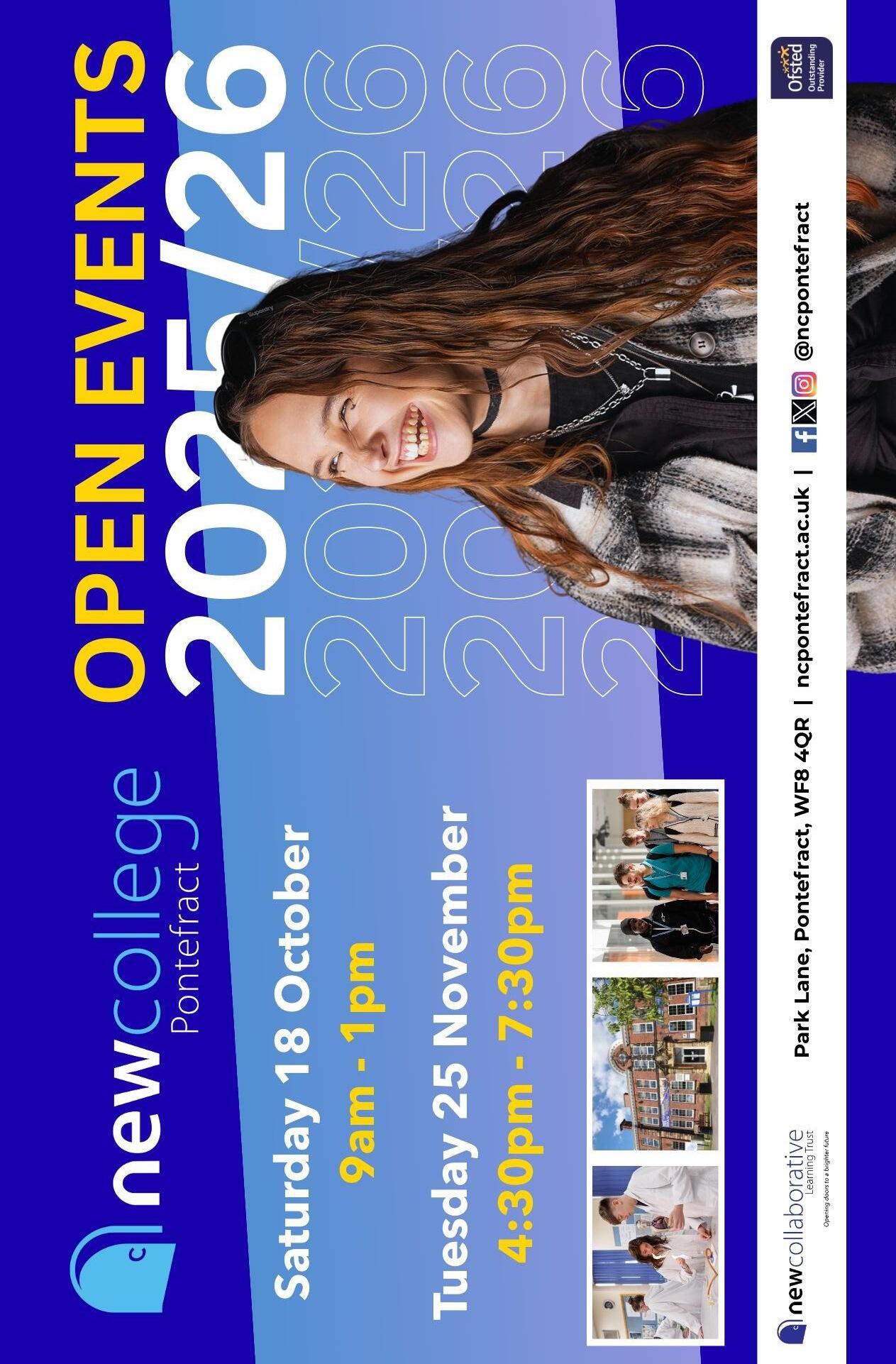

SOCIAL BUNCH


WELCOME
VICKY MARKS, CO-PRINCIPAL
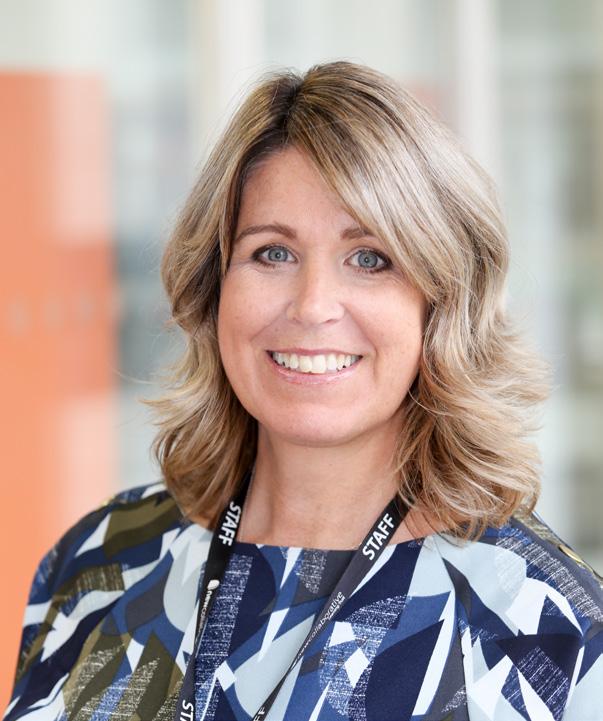
CHELSEA BRANSON, CO-PRINCIPAL
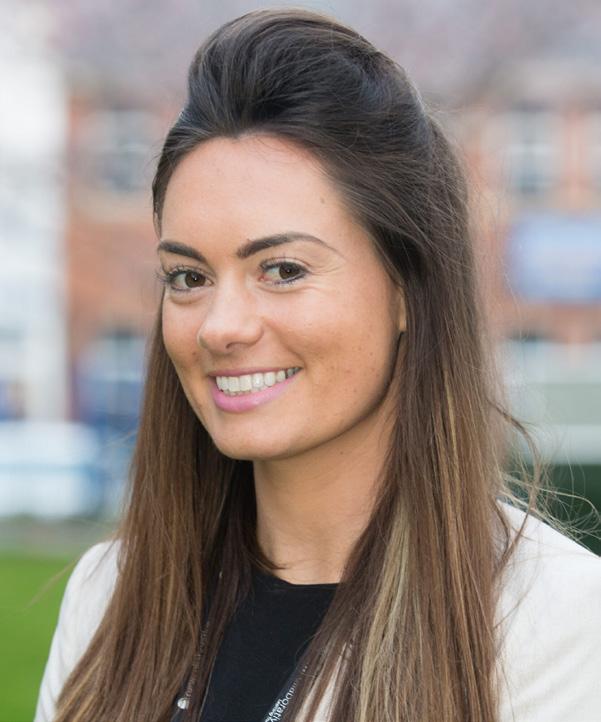

Welcome to New College Pontefract; we’re delighted that you’re interested in joining us for your post-16 education. Whether you want to follow an A-level, Applied General or mixed programme, you can know that in choosing New College you will study at one of the best colleges in the country. We have an established reputation for very strong exam performance, a passion for teaching and learning, and an unwavering focus on supporting every student towards achieving their best possible results.
Many people come to us because of the range of courses we offer, as well as the quality. We have over 50 different options, with more A-levels than any other provider in the area. Although your success in whatever course you choose will be our central focus, we also want you to grow as a young person during your time with us.
That’s why we offer an extensive range of extracurricular and super-curricular activities, many of which are listed in this prospectus and all of which will help you develop wider skills. Performing arts, sport, foreign exchanges, global expeditions and travel are among the range of opportunities on offer to push yourself and explore where your passions lie.
Coming to New College means you’re also choosing a provider who will recognise you as a young adult. College is an important stepping stone between school and the world of work or university and we will respect you as an individual, encouraging you to work in partnership with staff to achieve your goals. We will help you to take increasing responsibility for your learning and to develop the self-confidence, skills and knowledge to help you to progress in life, work and future study.
We are genuinely passionate about what we do, and we would love to work with you as you embark on the next exciting stage of your educational life.
“WE KNOW YOU WILL WANT TO WORK HARD”
10 GREAT REASONS TO COME TO NEW COLLEGE
A Specialist Team
of Progress Tutors who provide friendly and professional guidance from your first application interview to exam results day, and every point in between.
and enthusiastic teachers with expertise and specialist subject knowledge. where everyone is valued and respected. exam results.
with a great track record of helping students progress on to university, training and employment.
Highly Qualified An Adult Atmosphere Consistently Outstanding Expert Careers Advice An Extensive Enrichment Programme
A Commitment
including the highly regarded Duke of Edinburgh Award Scheme, World Challenge, Performing Arts, Competitive and recreational sports and much more. to ensuring that the transition between your High School and New College is as smooth is as possible.

A Wide Range
of A-level and Level 3 Applied General courses.

Where you are treated as young adult learners.
A Learning Resource Centre An Independent Study Culture
with multiple floors of independent study space, IT facilities, textbooks, journals and bookable study rooms.
RESULTS Congratulations To All Our 2025 Year 13 Students
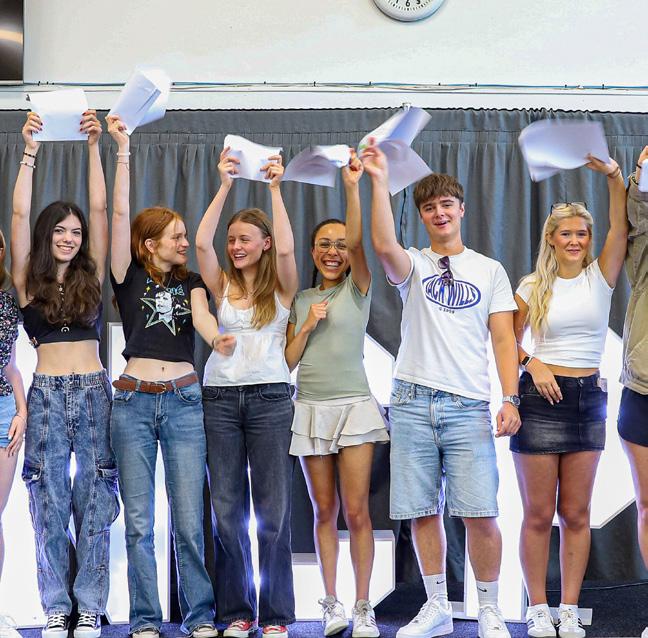
Students at New College Pontefract are celebrating another year of academic success, with results that have enabled the vast majority to progress to their chosen university courses, apprenticeships, or employment opportunities.
Overall, 62% of A-level students achieved an A*, A or B in their results, beating the 2024 figure by 3%. It is also 1% higher than the 2019 figure, making 2025 the best A-level high grade result outside of the Covid years. An outstanding 85% of students achieved A*-C, and 30% achieved the very top grades of A*- A. Overall, 99.4% of students passed their A-level courses.
Students on Applied General courses also performed exceptionally well, with a 100% pass rate and 71.1% achieving a Distinction or Distinction* - the highest grades available on these qualifications.
These figures may also improve slightly as exam boards process requests for reviews and remarks.
Vicky Marks, Co-Principal of New College Pontefract, said: “We are absolutely thrilled with this year’s results which are the best we have seen in the past 3 years. Our students have truly excelled, and it’s inspiring to see so many of them achieving such high grades and securing places on competitive university courses and apprenticeships. These outcomes are a testament to their dedication and resilience, and we couldn’t be prouder.”
These outcomes build on New College’s excellent track record of helping students make meaningful progress toward better life outcomes during their time at college.
Brendon Fletcher, Executive Head for Sixth Form Education at New Collaborative Learning Trust, added: “This year’s results reflect the incredible talent and ambition of our students across the Trust. We’re seeing more young people than ever before accessing life-changing opportunities - whether that’s at top universities, in apprenticeships, or in the workplace.”
HOW DO I APPLY?
To Apply To New College For Entry In September 2026, Follow The Five Steps To Enrolment.
1. Attend one of our Open Events. These are strongly recommended.
2. Apply online. Using the college website at: ncpontefract.ac.uk/apply
3. Attend an interview. Where you will hopefully be offered a conditional place. We will write to you with all the details in advance.
4. Attend our Induction Day. [After your final GCSE exams] where you can sample lessons from the subjects you have chosen.
5. Bring proof of your qualifications. To Enrolment Day and become an official New College student.
Application Deadline: Monday 23rd February 2026
We advise you to apply as soon as possible.
The sooner you apply, the sooner we can invite you to interview to discuss course options and availability.
It is unlikely that you will be offered a place if you miss the deadline due to recent high demand.
Open Events
Our open events are a fantastic way to find out about all of our courses and are strongly recommended. See below for the dates and times of these events.
Saturday, 18th October 2025: 9:30am - 1:30pm Tuesday, 25th November 2025: 4:30pm - 7:30pm
If you have any questions or queries about anything related to applying to New College, then please contact student services on 01977 702139, or the school liaison team: info@ncpontefract.ac.uk
Enrolment
If you are offered a conditional place you will be invited to enrol on either 20th or 21st August 2026. It is extremely important that you make yourself available on both of these dates so that you can attend at your allocated date and time. Details of appointments will be sent in July.
If you are not able to attend your allocated enrolment appointment you may find that course options are limited, or that places in college are no longer available. Please take note of these important dates.
First Interview
All students who apply will be invited into college to have an interview with one of our experienced staff.
At the interview we will discuss your proposed course choices and find out more about your career aspirations. The interview is a key part of the application process and provides the opportunity to discuss your predicted qualifications and course choices, ensuring that they are right for you.
HOW WE SUPPORT OUR STUDENTS
“STUDY SUPPORT AT NEW COLLEGE IS BEYOND AMAZING AND ACCOMMODATING OF YOUR NEEDS”.
EMILY COULTER - EX-NEW COLLEGE STUDENT
Progress Tutors
Your Progress Tutor will help you settle into college life when you arrive, and will support you as you adjust to the challenge of managing your workload and achieving your grades. Your relationship with your Progress Tutor will be key to ensuring you get the very best out of college life and engage with it fully. Tutorial sessions held once a week in Year 12 will be a mixture of one-to-one support sessions and important relevant topics, such as social and career related issues. In Year 13 your tutorial will be designed to support you with your UCAS application to university or apprenticeship/job application.
Assessments
We need to know how you’re performing so we can help you achieve outstanding results. Both your Progress Tutor and subject teachers will review your progress on a regular basis, focusing on your achievement and attendance in each subject. Together you will agree targets to ensure motivation, direction and a clear plan of action to keep you on track and improving.
All this information will be recorded and will be accessible to both parents and students securely via Cedar, our online portal.
Teacher Access PeriodsOne-To-One and Small Group Support
Every subject, every week will have a designated session for additional support, helping students to catch up on missed work, or to complete extension activities.
These Teacher Access Periods are one of the most important strategies we use to help students push themselves to achieve higher grades, or catch up if they have fallen behind.
There is a direct link between improved performance and contact time with teachers, which is why our Teacher Access Periods can make a real difference.

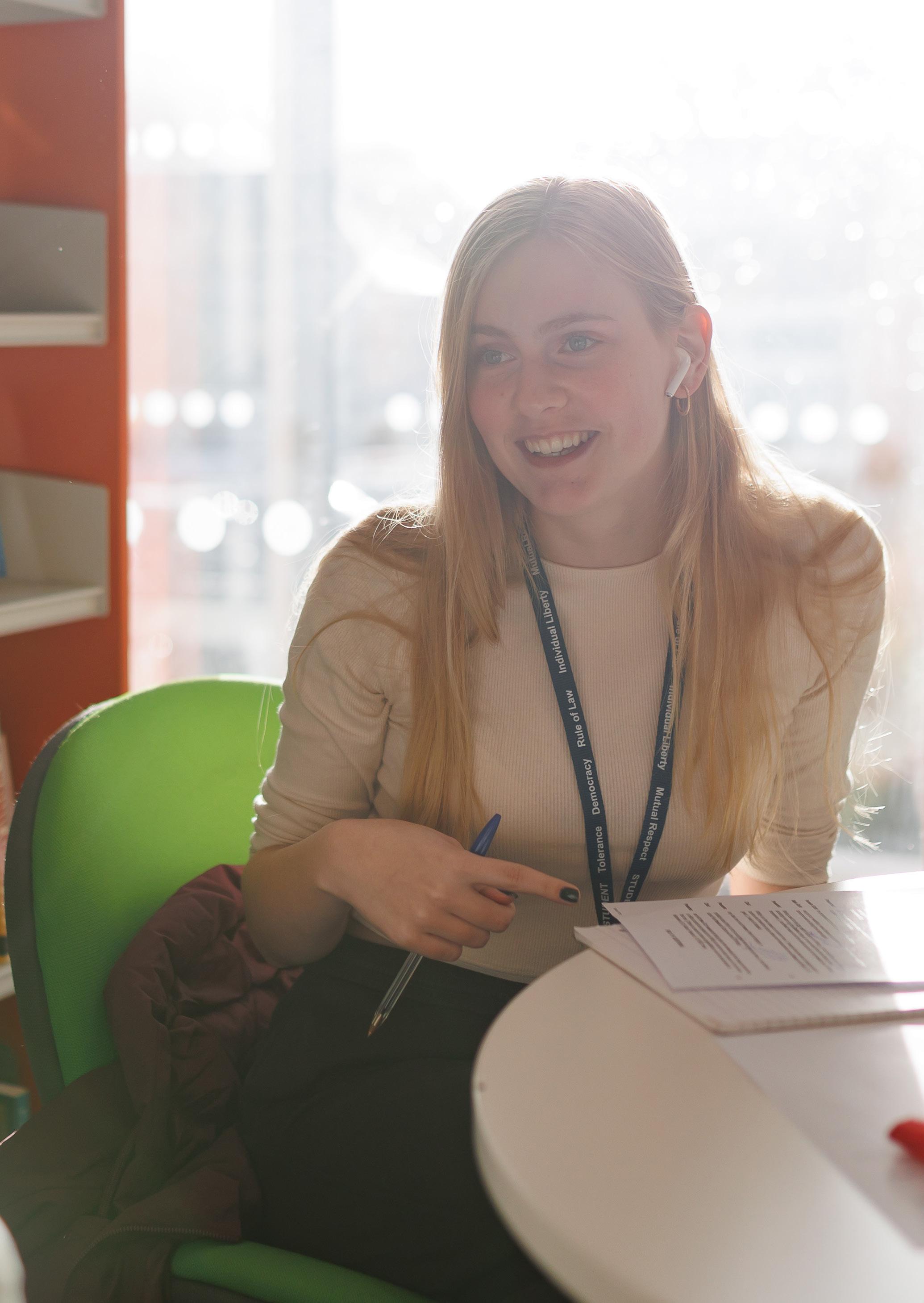
STUDENT SUPPORT
Study Support
The Study Support Team will also help you maximise your educational achievements.
Our welcoming and professional tutors will give you individual help with any aspect of your studies, through a service that is open to all students, whatever their target grade. Students often seek help with study skills, writing skills and GCSE Maths and English. We actively promote a policy of inclusion, so specialist support is available for students with health problems or disabilities, such as cerebral palsy, autism and dyslexia.
Our provision often includes access arrangements for examinations, such as extra time and the use of computers. It is very important that you disclose any disabilities or difficulties on your college application so we can plan in advance to meet your needs.
Visit our website for more information.
Directed Independent Learning
Directed Independent Learning
This is at the heart of every students’ success.
Taking responsibility for your own learning is essential if you are to succeed in post-16 education.
College life differs in some important ways from school life, and this may be partly why you are interested in joining us. To start with, there are no uniforms and no bells, and you are encouraged to call staff by their first names. However, taking responsibility for your learning is a part of this young adult approach.
You will have study periods on your timetable where you will be expected to undertake your Directed Independent Learning.
You will set independent learning tasks for each subject: these will help you to feel prepared for lessons; to consolidate learning and to build up effective retrieval of the new knowledge you will be gaining throughout your courses.
The time expectation for this will increase as the courses progress.

Wellbeing Hub
New College offers support to students through a free and confidential counselling service which is provided for all students to access throughout their time at college.
The counselling service is provided by qualified counsellors and is here to provide students with the opportunity and space to think, talk and explore any difficulties they may be experiencing in a safe and non-judgmental environment.
The Wellbeing Hub also offers support to students from external agencies around mental health and wellbeing.
Financial Support 16-19 Bursary Fund
The college can provide financial support to help some students during their time at New College. Financial support includes:
• 16-19 Discretionary Bursary Support.
• Free College Meals.
• Travel Grant.
• Laptop and specialist equipment loans.
This financial support is means-tested and students may be eligible depending on their total household income and certain criteria. To find out more about eligibility and how to apply, please visit:
ncpontefract.ac.uk/supporting-you-financially
The Learning Resource Centre (LRC)
The Learning Resource Centre (LRC) offers students a range of services to support all your revision and study needs, as well as a wealth of resources for you to access, including books, journals, computers and other hardware, digital resources and audio-visual materials.
The LRC also offers facilities to suit all of your study preferences, such as bookable study rooms and group rooms.
Whatever you may need to support you outside of lessons, you can find it here.
Microsoft Teams
Microsoft Teams will be an important resource during your time at New College.
Your teachers are likely to set your directed independent learning tasks through Teams, as well as giving you access to a wide range of supportive learning resources.

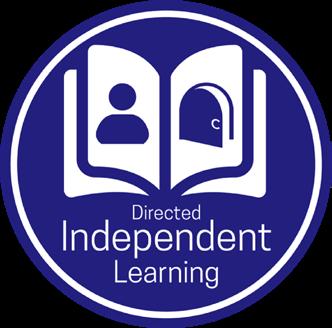
STUDENT SUPPORT
At New College we provide tailored support for you so that you have the very best chance of progressing from New College to a great university, apprenticeship or job. We’ll ask you to review your career plans at key points, so that we can signpost relevant talks by visiting universities or employers, or arrange for you a careers interview.
We’ll support you in finding high quality work placements if you have particular careers in mind, such as medicine or teaching, or if you’re studying Applied General courses which include work placements, or if you’re considering work or apprenticeships rather than university.
The broad range of activities available as part of our Excel@NCP programme have been specifically designed to prepare, support and engage all students in their applications to university and degree level apprenticeships.
This includes applications to Russell Group universities, Oxford and Cambridge, and for very competitive degree courses which have extra hurdles to overcome. We’ll also create opportunities for you to engage with universities, employers or apprenticeship providers within the courses you are studying.
The Russell Group represents 24 leading universities who are at the cutting edge of academic research and provide an outstanding teaching and learning experience for their students. Many of our students go on to attend Russell Group universities, studying subjects such as English, History and Maths, or Dentistry, Medicine and Veterinary Science. Russell Group universities, like Oxford, Cambridge, Leeds, Manchester and York are the most competitive HE institutions in the country. The Russell Group have high expectations of their undergraduates, particularly focusing on academic achievement.
Our careers team have helped thousands of students get places on degree courses at these universities and, along with the support from Progress Tutors and subject staff, are well placed to maximise your chances of success.

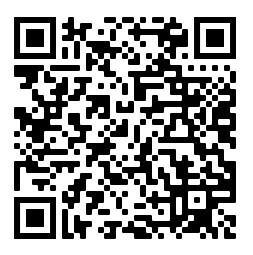

The Excel@ programme is tailored to each individual student, and could include:
Oxbridge Programme
• Visits to Oxford and Cambridge.
• Visiting speakers from the universities.
• Support from former New College students who have attended Oxford and Cambridge.
• Dedicated support at every stage of the application process.
• Highly experienced support with personal statement and interview preparation.
• Information and support on external pre-interview assessments.
Achieving Aspirations Programme
The Achieving Aspirations Programme focuses on supporting students in successful applications to competitive courses and universities such as the Russell Group, including Oxford and Cambridge. The programme offers dedicated advice, information and skills development related to all aspects of the application process from a specialist team, allowing students to maximise their chances of not only securing places at centres of academic excellence, but of thriving once they are there.
Medic, Dentist & Vet Group
• Aptitude test information (BMAT & UKCAT).
• Support with interview preparation for Multiple Mini Interviews (MMIs).
• Talks from ex-New College students and other medical, vet and dental professionals.
• Support with arranging work experience/voluntary work required for university applications.
Widening Participation Scheme
Working closely with a number of local universities, we promote opportunities to help students throughout Years 12 and 13, where they have limited experience of higher education. Such support includes:
• Attending subject taster sessions.
• Preparing for independent living at a university.
• Access to undergraduate mentors.
• Specialist advice on personal statements and interviews.
• Attending summer residentials.
• Lower conditional offers awarded as a result of participating in the programme.
Extended Project Qualification (EPQ)
• How to find and evaluate appropriate sources and to reference them correctly.
• Reading and note-taking strategies.
• Interpreting data and analysing evidence.
• Academic writing.
• Presentation skills.
• Nationally recognised qualification accepted by universities.
• Research Skills Project: a bespoke, NCP mini-EPQ programme – offered as a stand-alone enrichment or as a springboard to the EPQ.
Supercurricular Activities
• Advice and access to extra courses (Summer Schools, online courses such as MOOCs).
• Advice and support with wider reading beyond your subject.
• Communication skills: develop confidence in debate, discussion and public speaking.
• Oracy award.
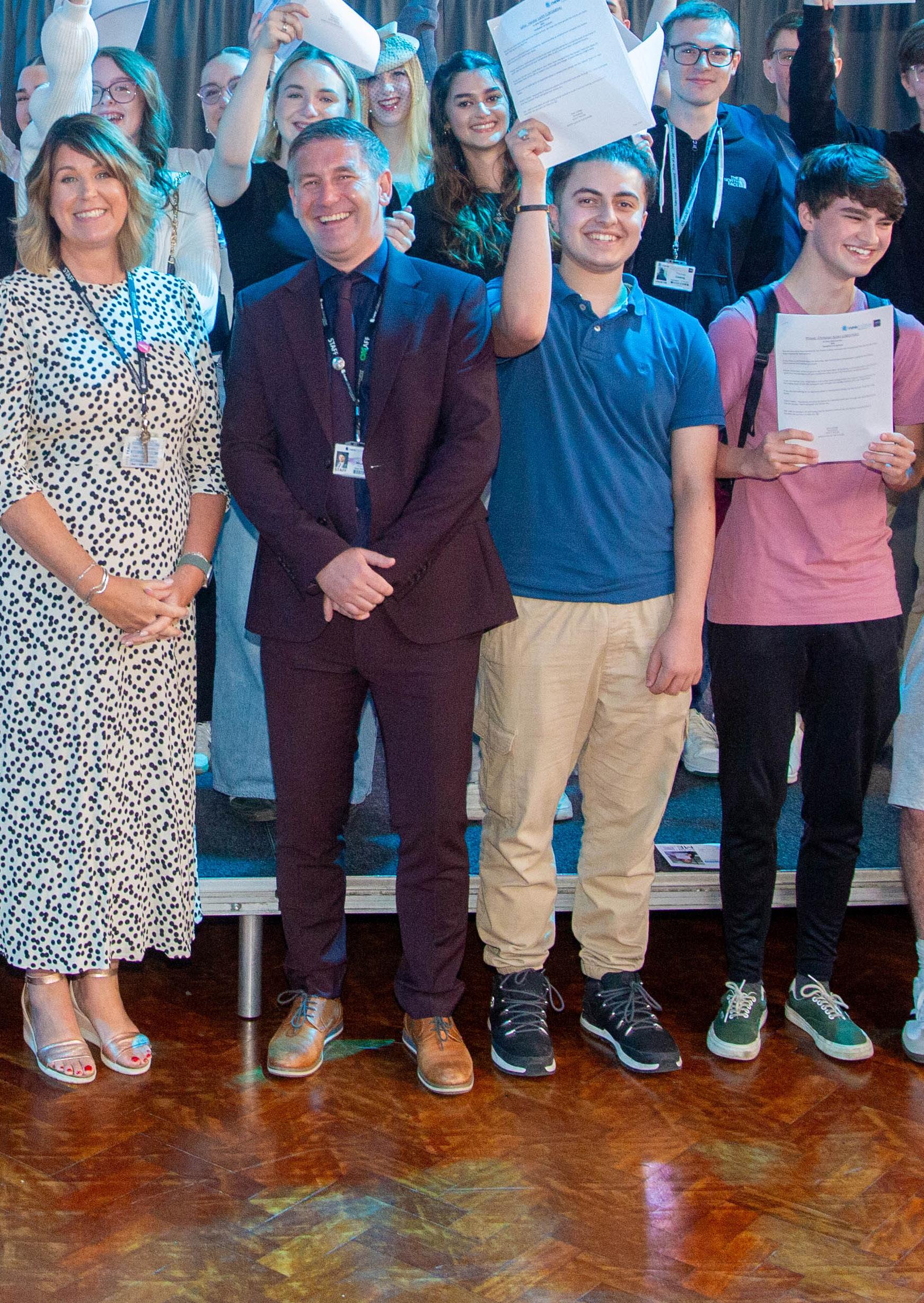
Employability Skills
At New College we take your next steps very seriously. After your two years with us you will be able to progress with the qualifications and employability skills you need to succeed in the world of work or in your further studies. We call this the OPTIC scheme.
ORGANISATION PROBLEM SOLVING TEAMWORK INITIATIVE COMMUNICATION
HOW WE SUPPORT YOU WORK EXPERIENCE
New College encourages all students to participate in the Work Experience Programme. For students applying to some university courses, work experience is a requirement. For others, it may be an integral part of their college course. For all students it will provide them with a valuable experience of the workplace and the opportunity to develop new skills and knowledge to support their future career goals.
You will be given support before, during and after your placement to ensure you have a successful experience in a relevant, safe and friendly environment.
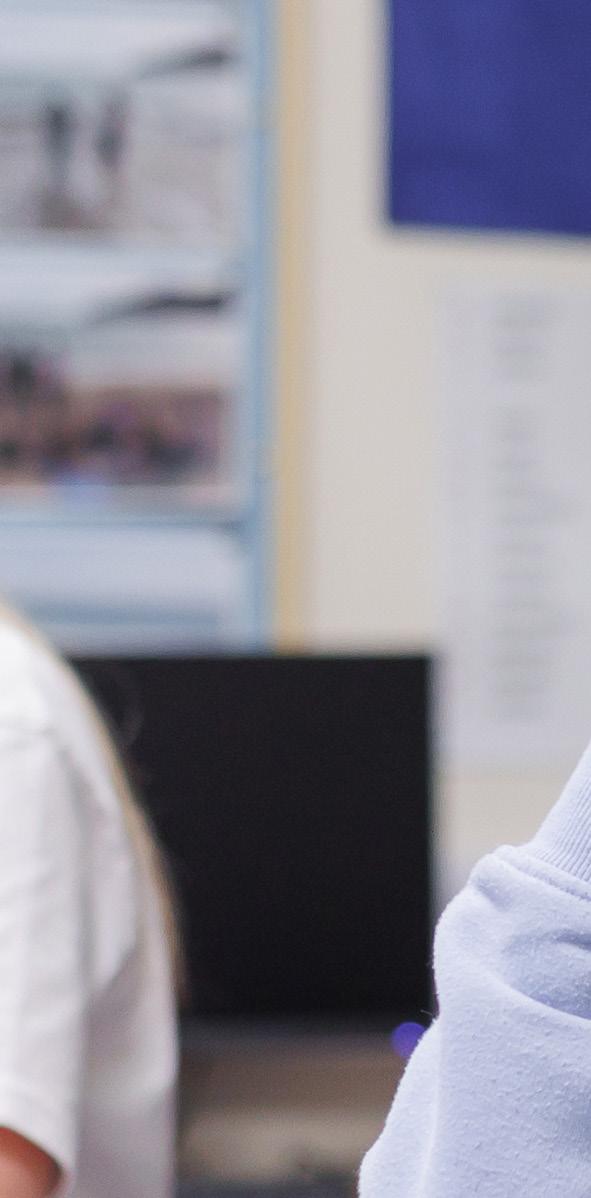
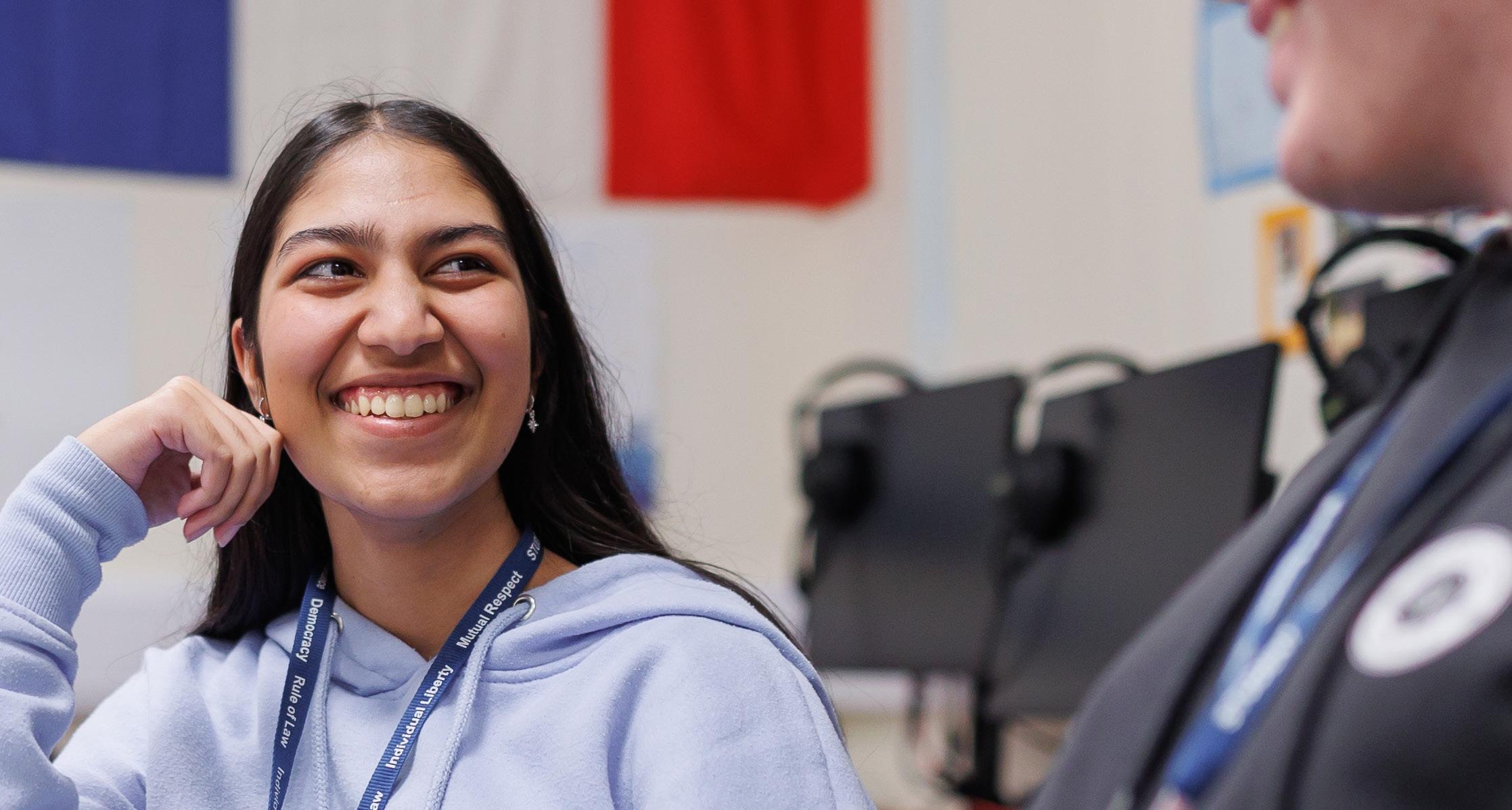
Careers Advice
Qualified Careers Advisors work alongside our Progress Tutors to ensure you receive specialist guidance as you plan for your next steps after college. You will be encouraged to research your options carefully as you plan for your future, whether that be in the world of work or university.
Progress Tutors also provide career guidance as you plan your next step after leaving us, whether this is going on to university, an internship, gap year or employment. They will encourage you to research your options and support you along the way, helping you to plan your future, whether that be in the world of work or university.
A large number of New College students progress to Higher Education each year.
We provide specialist advice for students considering applying for competitive courses such as dentistry, medicine and veterinary science, as well as supporting students applying to universities from across the country. In the summer we hold an annual Careers and HE Day with over 100 speakers from local universities and employers.
We also work hard to support our students who may be seeking employment or apprenticeships after studying at college. This includes our annual apprenticeship fair and parents/carers event.
We support our students seeking employment with application form preparation, CV writing, group assessment day and interview practice, and with adverts for suitable vacancies and apprenticeships.
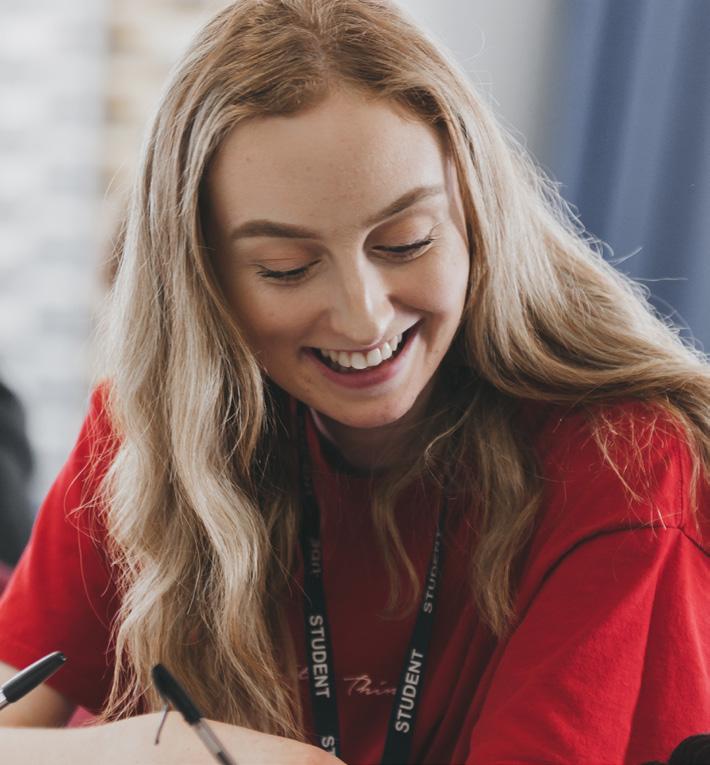
There is an expectation that all students will complete Work Experience during Year 12.
For students applying to some university courses, work experience is a requirement. For others it may be an integral part of an Applied General course. For all students it will provide them with a valuable experience of the workplace and the opportunity to develop new skills and knowledge to support their future career goals.
We also encourage students to complete virtual work experience. Virtual work experience compliments traditional work experience and in some cases, can provide an alternative solution to some industries where traditional work experience isn’t accessible.
PLAN YOUR FUTURE WITH CONFIDENCE Supporting Informed Career Choices through Pathways One
At New College, we are committed to helping every student make well-informed decisions about their education and future career.
To support this, we have invested in Pathways One and Pathways Explore - an advanced digital platform that links our courses directly to real-world career opportunities. This allows you to browse a wide range of career options, with over 850 occupations linked directly to the courses we offer and ensures you can clearly see how your interests translate into relevant study options at our college.
One of the key features is a short, engaging quiz that matches your interests and attributes to six personality types, such as Realistic, Investigative, or Artistic. Based on your profile, the platform recommends suitable careers and connects them to relevant courses. Each career profile includes detailed labour market information, including salary expectations, job growth forecasts, and progression routes - whether academic, vocational, or apprenticeship-based. You can also explore similar job roles, live vacancies, and local apprenticeship listings.
Whether you are considering A Levels or Applied General qualifications, Pathways One provides clarity and guidance, helping you to understand how your course choices can lead to meaningful employment outcomes.
You can access Pathways One on each of the course pages of our website and you can access the Pathways Explore service by scanning the QR code or visiting:
ncpontefract.ac.uk/pathways-explore



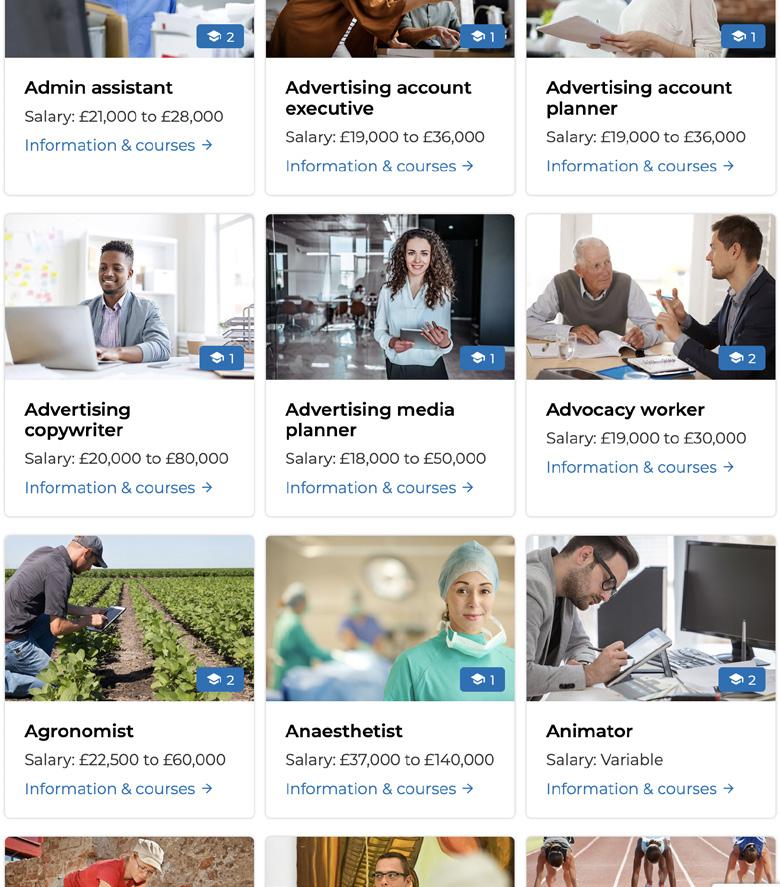
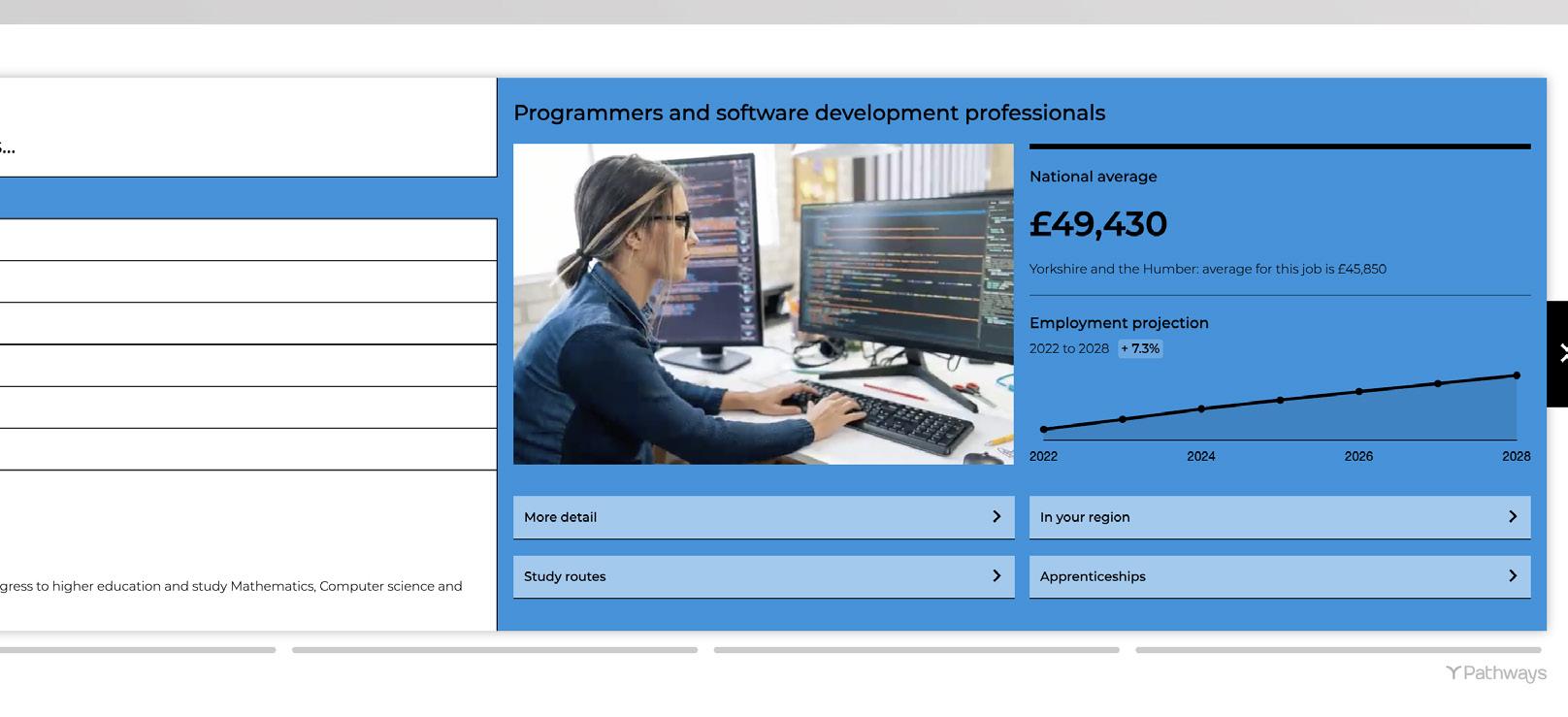
ENRICHMENT
Our expanded enrichment programme encompasses a wide variety of activities and sessions that students can participate in, with over 80 activities taking place this year.
All of these are aimed towards enriching the academic curriculum, developing new skills and interests, promoting teamwork and social skills, and most of all having fun!
Students at New College take part in a range of enrichment activities whilst studying with us, helping to develop well-rounded individuals, with a wide variety of skills and experiences to help them stand out from the crowd in the next stage of their education or employment and future career.
Students can sign up to a number of activities throughout their two years, some being individual sessions and others lasting the entire academic year.
Student Executive Committee
All students have the opportunity to develop a leadership role within the college by getting involved in the Student Executive Committee. Students in Year 13 are able to stand for election to lead an area/group within college, whilst the opportunity to work within one of the groups is available to both Year 12 and Year 13 students.

For more information about any of our enrichment programmes, please visit:
ncpontefract.ac.uk/enrichment


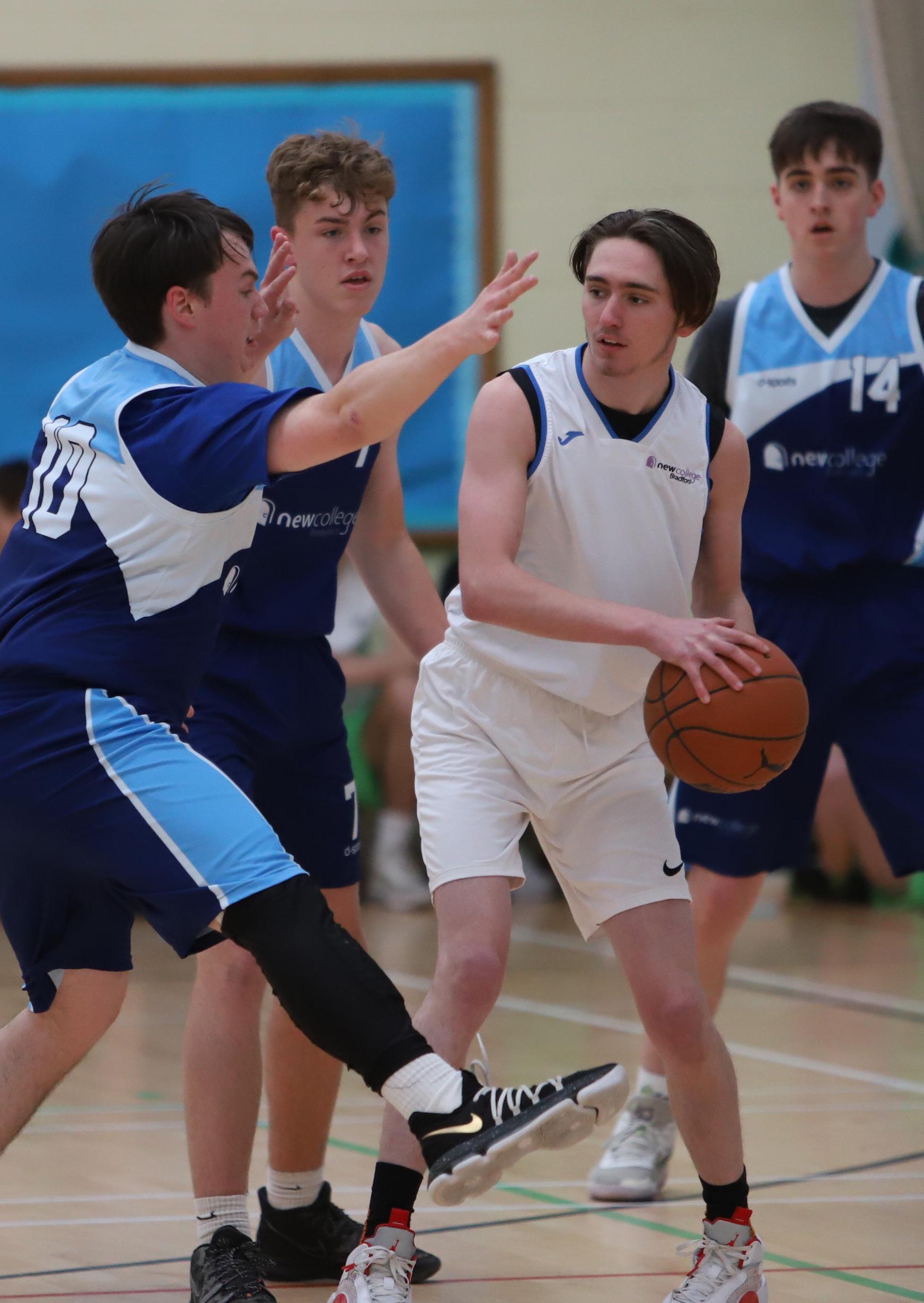
The enrichment activities we offer here at New College can be split into the following categories:
Health & Wellbeing
These activities aim to develop students’ physical and mental health, whilst also enhancing vital skills that are often required when participating in physical competitions including teamwork and co-ordination. Activities include Stress Less and Self Kindness, as well as a wide variety of recreational activities including Badminton, Table Tennis, 5-a-side Football, Cricket, Emergency First Aid and Self-defence.
Leadership & Life Experiences
Developing skills and experiences that build character as well as providing valuable experiences are fundamental to personal development. You’ll have a wide variety of experiences to take part in including Dragons Den Enterprise, NHS Values, and Sport Leadership. Popular activities also include the World Challenge and Duke of Edinburgh Award scheme, both of which are widely recognised in the world of work and held with high regard.
Super Curricular Activities
Our super curricular sessions enable students to develop a greater understanding of the subjects in which they have enrolled. Within these sessions they will often cover a wide variety of topics focusing on areas that may not be included in their course specifications, helping students develop their understanding of their subjects and the wider reading required.
Some of our super curricular activities include: Genetic Engineering, History Book Club, Philosophy Thinkers Club and Creative Writing. These can be hugely beneficial to students who may go on to further study of these subjects at undergraduate level.
Clubs & Societies
Participating in one of our clubs and societies is a great way to meet like-minded people and make new friends. Here at New College we have over 30 separate clubs and societies for you to participate in including LGBTQ+ Group, Darts, Esports, Feminist Group, STEM Club and the Legal Debate Club, with many more being planned and developed throughout the year.
Competitive Sport
Incorporated within our enrichment programme are a range of competitive sport programmes. By enrolling on to these programmes you will represent the college within the chosen sports and have the opportunity to compete against other teams from across the North of England. Each of the following competitive sports also has dedicated time allocated within your timetable to take part in training and competitive fixtures:
Football
Netball
Basketball
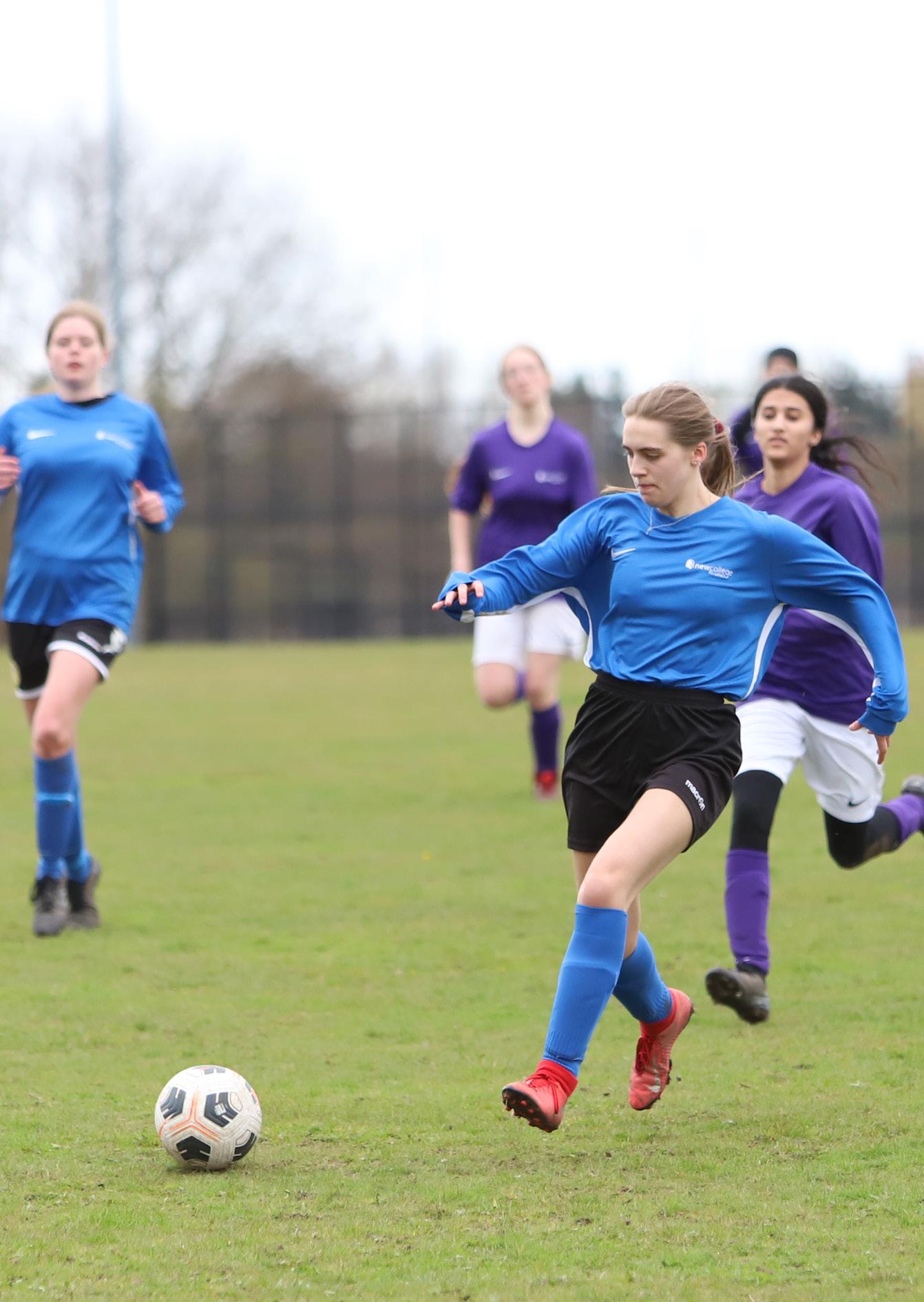
OUR ACHIEVEMENTS
Pearson National Teaching Awards
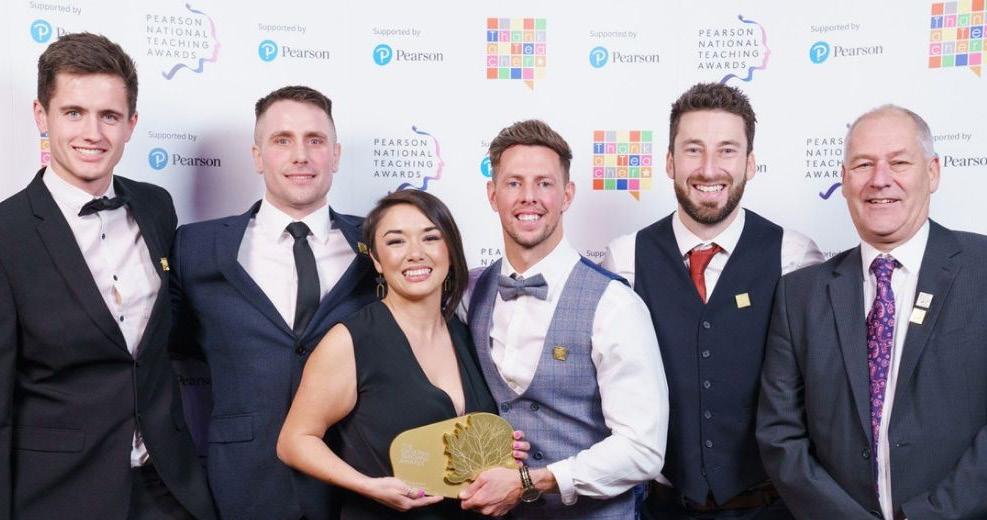
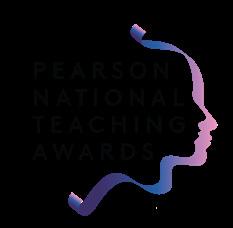

FE Team Of The Year, Gold Winner Sport And PE Department
New College Pontefract’s PE and Sports Studies department won the GOLD Award as FE Team of the Year from the Pearson National Teaching Awards, following their outstanding commitment to changing the lives of the students they work with every day.
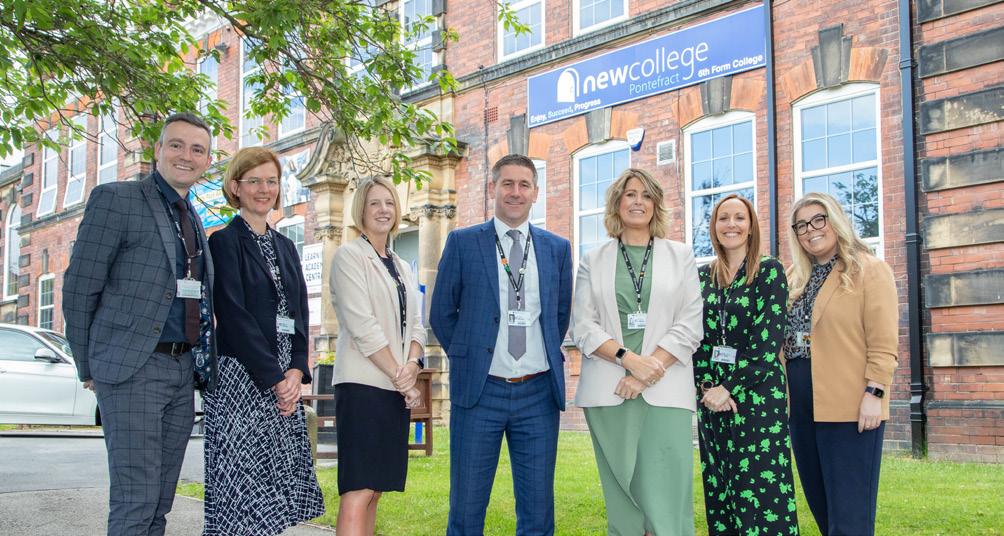

FE Team Of The Year, Silver Winner New College Pontefract Senior Team
New College Pontefract’s senior team won a silver Pearson National Teaching Award for FE Team of the Year. The award reflects the success that the leadership team have had over the past five years, with the expansion of the college, the creation of two sister colleges and the consistent outstanding success rates of all students, which have put the college in the top five of the DfE’s national tables for five years.
The Talented Athlete Scholarship Scheme provides young people in the local community the chance to develop their sporting ability and shine on the highest possible stage all whilst gaining an outstanding education and creating a TASS Dual Career. At New College you will have the opportunity to study a wide range of level three courses including both A-level and Applied General alongside your chosen sport. Find out more at one of our open events.
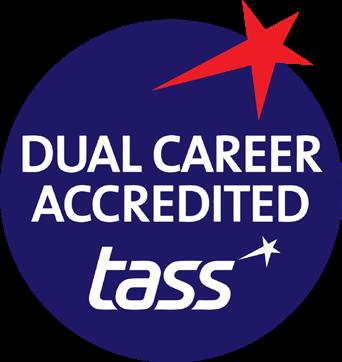

fe awards 2020
TES AWARDS 2020
Winner Sixth form college of the year
Winner Overall FE provider of the year
• SIXTH FORM COLLEGE OF THE YEAR
• OVERALL FE PROVIDER OF THE YEAR
New College Pontefract won the country’s highest award for its sector, claiming the title of Sixth Form College of the Year, at the TES FE Awards in 2020. So impressed were the judges by New College Pontefract, though, that they awarded the college the additional “best of the best” prize of Overall FE Provider of the Year, a title competed for by the winners of every sector in the competition. Not only does this mean that New College Pontefract is now recognised as the best post-16 FE provider in the country, it is also the first time in the history of the TES FE Awards that a sixth form college has ever won the Overall Provider of the Year title.
New College Pontefract secures second “outstanding” Ofsted judgement.
Wakefield’s largest provider of academic post-16 courses, New College Pontefract, has once again been awarded an “outstanding” report by Ofsted.
The inspection report found that the college’s students “demonstrate exemplary behaviour in lessons and around the college”, and that they “benefit from a very supportive culture at the college”, developing “very positive relationships with teachers and staff in a supportive role.”
Amongst the many high points, the report identified the college’s success with all students, including those with high needs, in achieving “their planned qualifications with high grades”, as well as pointing out that a
OTHER AWARDS

large number of students “progress to higher-level study at degree level or apprenticeships at level 4 and above”.
Teachers “provide highly specific feedback, which supports students to identify how they can achieve higher grades”, whilst the inspectors found that leaders and specialist subject staff “have designed a highly ambitious curriculum across a broad range of subjects”.
The report also praises the “very broad range of enrichment activities” on offer that “almost all students participate in”, as well as commending the College’s local advisory group and the Trust’s directors for helping “to steer improvements and ensure that leaders act promptly and effectively when required to do so”.
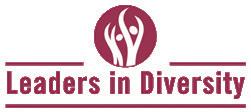


BUS ROUTES
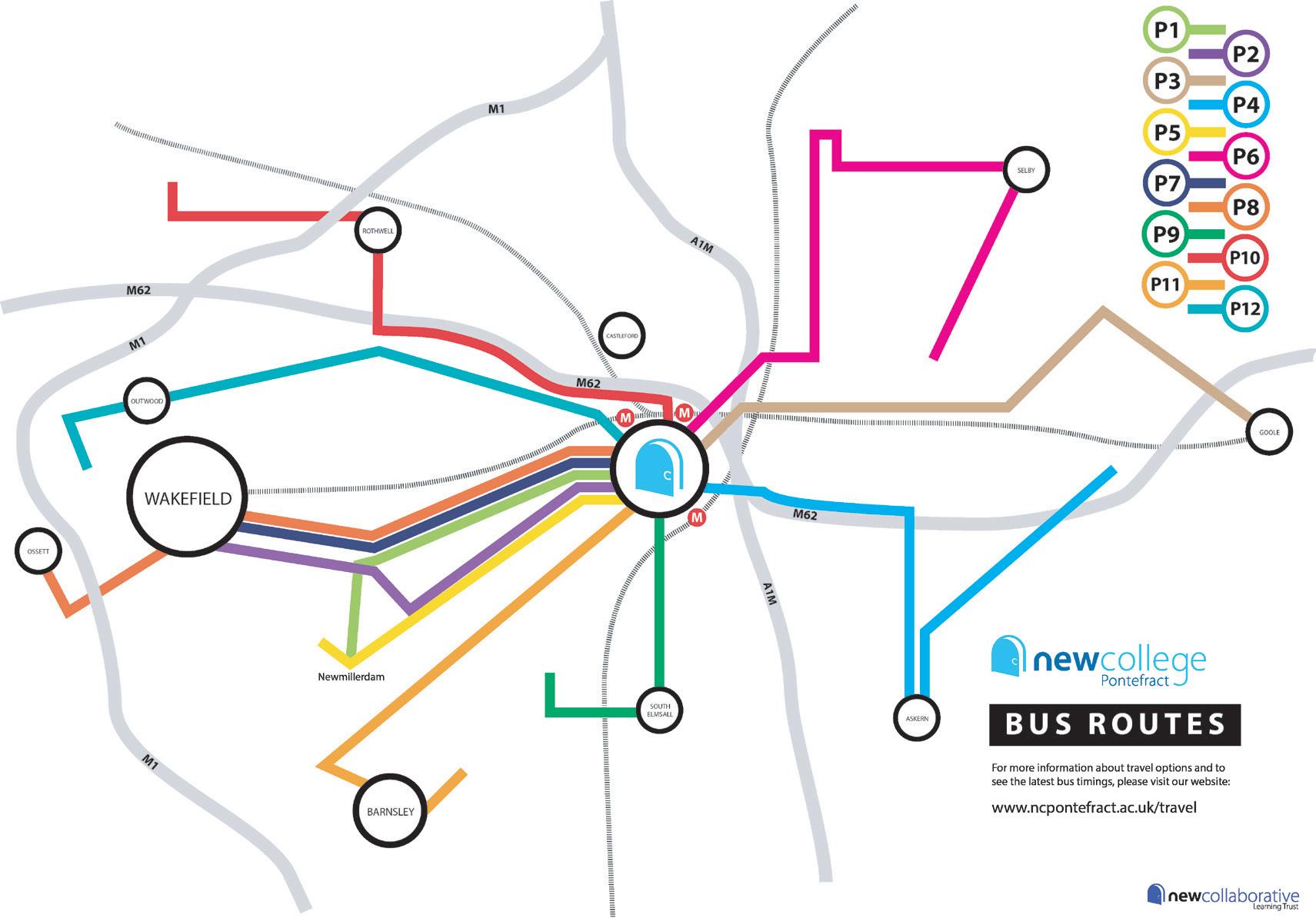
Additional Info
For all bus routes you should arrive at the bus stop 5 minutes before departure and signal the bus to stop.
• The bus will NOT STOP unless an indication is made to the driver that you wish to board!
• ALL BUSES CAN BE BOARDED AT ANY BUS STOP ALONG ALL ROUTES.
BUS PASS INFORMATION
• To travel on a New College bus, you must have a New College bus pass and it must be shown on each journey.
• Timings are subject to change, please check our website for the most up-to-date information.
P1
Wakefield Bus (P1 shown on front of bus)
Newmillerdam
Pledwick
Jet Station
Three Houses
Agbrigg Road
Agbrigg
Heath Common
Sharlston
Ackton
North Featherstone
New College
P5
Wakefield (P5 shown on front of bus)
Kettlethorpe High School
Durkar Low Lane
Newmillerdam
The P5 will then follow the P1 or P2 route depending on numbers on these routes
Please listen to the advice of the bus drivers
P2
Wakefield Bus (P2 shown on front of bus)
Union Street (Next to Bus Station)
Belle Isle
Agbrigg
Walton
Crofton
Weavers Green
Cock & Crown
Sharlston
Ackton
North Featherstone
New College
P9
Shafton (P9 shown on front of bus)
Shafton
Shafton Cross Roads
Cudworth
Grimethorpe
Brierley
South Kirkby
Minsthorpe
Upton
Badsworth
Thorpe Audlin
East Hardwick New College
P3
Gowdall/Hensall (P3 shown on front of bus)
Goole
Drax
Camblesforth
Carlton
Snaith
Gowdal
Hensall
Eggborough
Kellington
Beal
Kellingley
New College (Castleford Road)
P4
Goole Bus (P4 shown on front of bus)
Rawcliffe Green
Cowick
Pollington
Heck
Balne Moor
Norton
Campsall
Askern
Whitley
New College (Castleford Road)
(Please note that the vehicle will turn immediately onto M62 at Whitley & therefore any students from Eggborough must catch P3 service)
P6
Eggborough to Sherburn via Selby (P6 shown on front of bus)
Eggborough
Chapel Haddlesey
Burn
Brayton
Selby
Selby Interchange
Thorpe Willoughby
Hambleton
Monk Fryston
Sherburn in Elmet
South Millford
New College
P10
Leeds (P10 shown on front of bus)
Cemetery Road
Old Lane
Aldi in Middleton
Wynsors/Asda
Sharpe Lane Primary
Wood Lane
Park Lane
Styebank Lane
Esso Petrol Station
Three Horse Shoes Pub
Royds School
New College
P7
Wakefield Bus (P7 shown on front of bus)
Union Street (Next to Bus Station) 8:00am
Belle Vue 8:07am
Agbrigg 8:09am
Sharlston 8:15am
Ackton 8:22am
North Featherstone 8:25am
New College 8:30am
P11
Barnsley/Royston (P11 shown on front of bus)
Lundwood Wilco Motorsave
Schwabisch Gmund Way -
Transport Interchange Barnsley
College Tesco Express
Huddersfield Road
Darton Rose and Crown Pub
Mapplewell Barnbrooks Grill
Royston Old Fire Station
Carlton Community College
Ackworth Beverley Arms
Brown Cow
New College
P8
Wakefield Bus (P8 shown on front of bus)
Church Road
Morrisons (opposite side of road)
Ossett Town End
Ossett Football Ground
Ossett Drill Hall
Horbury High Street
Horbury High School
Redcats
St Michael’s Church
Westgate Station
Old Woolworths New College
P12
Outwood (P12 shown on front of bus)
Flanshaw Lane
Batley Road
Wrenthorpe Lane
Potovens Lane
Church Lane
Leeds Road
Broadmeadows
Rooks Nest Road
Lake Lock Road
Junction of M62
New College
New College offers 12 private bus routes operated by Poppleton’s Coaches, serving many surrounding areas of the region. We heavily subsidise the cost of the pass to make it easier than ever for you to access New College.
WHO WE ARE
We are a multi-academy trust comprising of three sixth form colleges, a secondary academy and three primary schools. We have a strong track record of improving the quality of education, raising aspirations and helping young people progress to higher education, apprenticeships and careers. Dinnington High School and Brinsworth Academy will officially become part New Collaborative Learning Trust this year.
Our vision: Our colleges and schools will make a significant difference to the lives of young people. As a result, together we will make a positive contribution to social mobility.
Our Commitment: To provide an outstanding, consistent student experience through collaboration.
Our 4 Priorities
Our Values: The 5 Cs
Candour: To be open, honest and fair to everyone.
Challenge: To have high expectations of ourselves and each other.
Collaboration: To learn from each other for the benefit of all.
Commitment: To be dedicated, resilient and strive for continuous improvement.
Care: To be considerate of other and their needs.
NEW COLLABORATIVE LEARNING TRUST NAMED ‘EMPLOYER OF THE YEAR’
New Collaborative Learning Trust won Employer of the Year at the 2023 MAT Excellence Awards. The national awards celebrate the very best performers from over one thousand MATs across the country.
NCLT were also shortlisted for Wellbeing MAT of the year, reflecting their commitment to putting staff and student wellbeing at the heart of their strategies and policies.
As we continue to thrive, we know that looking after our staff and students is key to our future success.
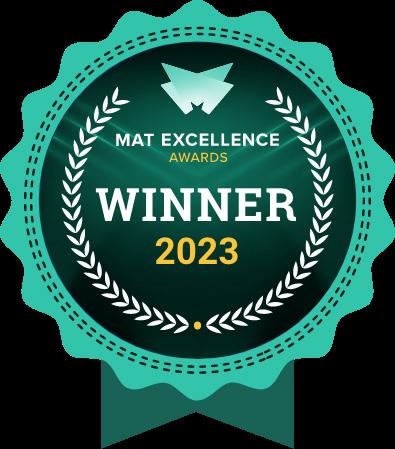
Address: Nelson St, Broomfields, Bradford BD5 0DX
Phone: 01274 089189
Address: Hurst Ln, Auckley, Doncaster DN9 3HG
Phone: 01302 976777
Address: Park Ln, Pontefract WF8 4QR
Phone: 01977 702139
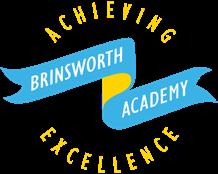
Address: Brinsworth Road, Brinsworth, Rotherham, S60 5EJ
Phone: 01709 828 383
Address: Doe Quarry Ln, Dinnington, Sheffield S25 2NZ
Phone: 01909 550066
Address: Wingfield Rd, Rotherham S61 4AU
Phone: 01709 513002
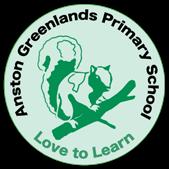

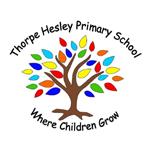
Address: Edinburgh Dr, North Anston, Sheffield S25 4HD
Phone: 01909 550557
Address: Kimberworth Park Rd, Rotherham S61 3JT
Phone: 01709 740350
Address: Upper Wortley Rd, Thorpe Hesley, Rotherham S61 2PL
Phone: 0114 257 0153
THE TUTORIAL PROGRAMME
New College represents an important stepping-stone between high school and university or employment.
We treat our students as young adults in a supportive but challenging environment, helping you to feel safe whilst stretching you to perform at your best, academically and with our enrichment programme. This means we expect you to take more responsibility for your own learning and to act as responsible adults, whilst giving you more freedom, for example around how you use your time outside of the classroom. Our tutorial sessions are an essential part of the New College experience and have been specifically designed for our 16-19 students by our specialist team.
This carefully developed tutorial programme covers key information on:
NEW COLLEGE’S CULTURE. MENTAL HEALTH, WELLBEING & RESILIENCE. HEALTHY RELATIONSHIPS.
FUNDAMENTAL BRITISH VALUES. CURRENT AFFAIRS & WIDER TOPICAL ISSUES.
NEXT STEPS AFTER COLLEGE: Including Degree Apprenticeships & university.
We recognise the importance of becoming well prepared for your future and this bespoke programme enables you to move onto positive destinations, building and developing your skill set along the way.
You will have tutorial once a week as a group, but then your Progress Tutor will meet with you on a one-to-one basis, as well as be there should you have any further queries.

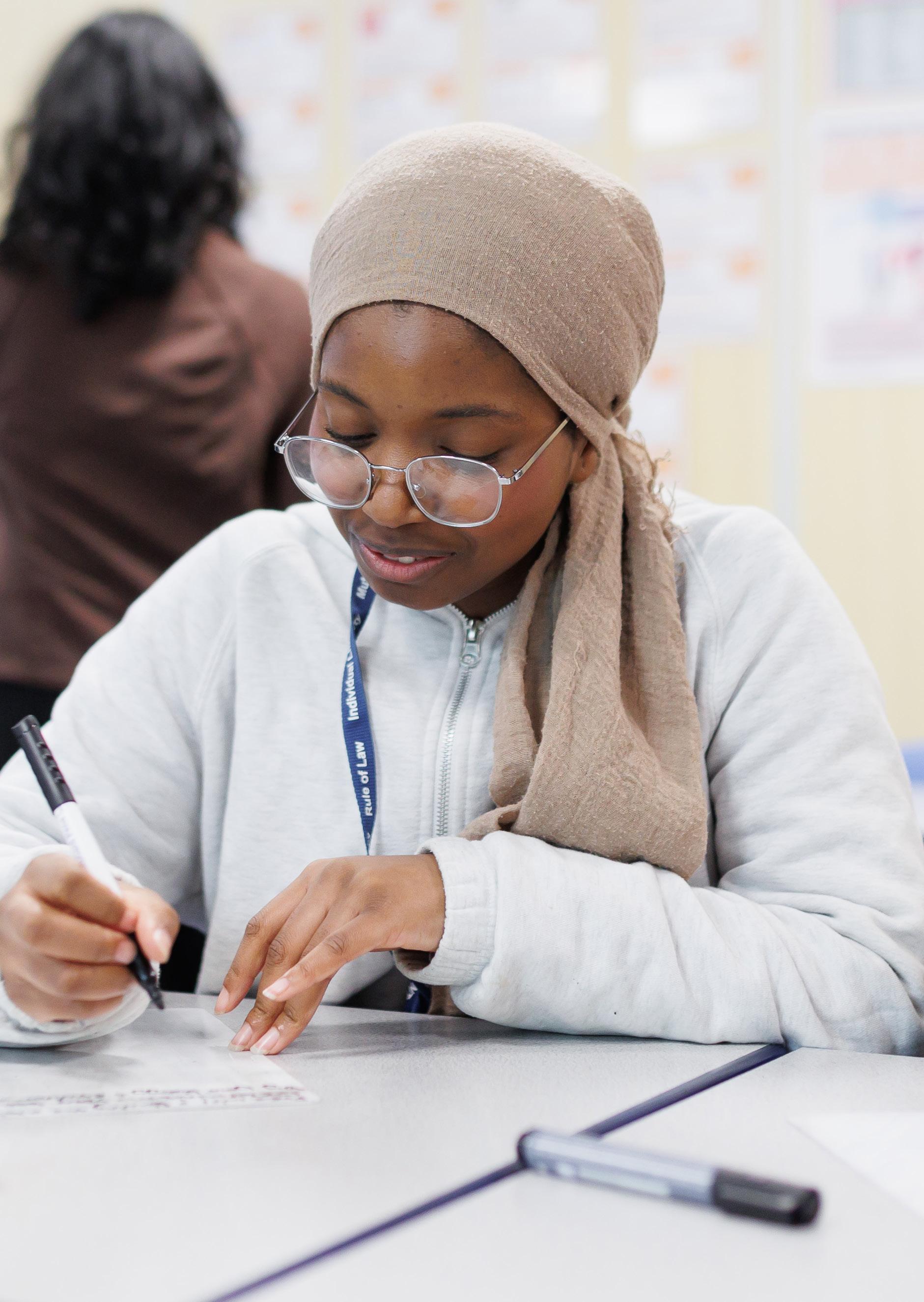
Student Quotes Phillip
Year 12 student
“Tutors are supportive and approachable for your problems and needs. The weekly sessions are something I look forward to, being fun and interactive as well as a good way to find out the best next steps for you.”
Abi
Year 13 student
“Tutorial has helped me gain knowledge, helped with my understanding about university and created a safe place where I could gain support and develop into the person I am now. Tutorial helped me with my successful application to my top choices for university.”
Accounting
A-LEVELCOURSES & REQUIREMENTS
Business
Chemistry Biology
Computer Science
Dance
Drama
Economics
English Language
English Language & Literature Combined
English Literature
Film Studies
French
Further Mathematics
Geography
Graphic Design
- Grade 4 in English Language
- Grade 6 in Mathematics
- Grade 6 in Biology and grade 6 in one other Science or 6-6 Combined Science
- Grade 5 in English Language
- Grade 6 in Mathematics
- Grade 4 in English Language
- Grade 5 in Mathematics
- Grade 6 in Chemistry and grade 6 in one other Science or 6-6 Combined Science
- Grade 5 in English Language
- Grade 6 in Mathematics
- Grade 4 in English Language
- Grade 6 in Mathematics
- Grade 6 in Computer Science (if studied) Grade 6 in Mathematics (Grade 7 if computer science not studied)
- Grade 5 in a Performing Arts subject or a merit in BTEC (if studied) and an audition
- Grade 5 in English Language
- Grade 5 in English Language
- Grade 5 in a Performing Arts subject or a merit in BTEC (if studied) and an audition
- Grade 5 in English Language
- Grade 6 in Mathematics
- Grade 5 in English Language
- Grade 5 in English Language
- Grade 5 in English Literature
- Grade 5 in English Language - Grade 5 in English Literature
- Grade 5 in English Language - Grade 5 in English Literature
- Grade 6 in GCSE Visual Arts subject If a GCSE Visual Art subject has not been studied, a portfolio will be required - Grade 4 in English Language 4.0 5.6 5.6 (or a 7 in Mathematics) (or a 7 in French) 5.6
- Grade 6 in English Language - Grade 6 in French
- Grade 4 in English Language
- Grade 6 in Geography - Grade 5 in English Language
Grade 4 in Mathematics
- Grade 5 in GCSE Visual Arts subject If a GCSE Visual Art subject has not been studied, a portfolio will be required
- Grade 4 in English Language
A-LEVEL
History
Law
Mathematics
Media Studies
EDUQAS
- Grade 6 in History (If studied)
- Grade 5 in English Language
- Grade 5 in English Language
- Grade 4 in English Language
- Grade 7 in Mathematics
- Grade 5 in English Literature or - Grade 5 in English Language
- GCSE Music grade 6 or BTEC distinction (if taken) or the ability to perform at grade 5 level minimum
Music
EDUQAS
Photography
Physical Education
Physics
Politics
Psychology
Religious Studies
Sociology
Spanish
Textiles & Fashion Design
EDEXCEL
- All students must have an audition. All students should be willing to work towards grade 5 theory if not already taken and aim to be a minimum of grade 6 practical by year 13
- Grade 5 in English Language
- Grade 5 in GCSE Visual Arts subject. If a GCSE Visual Art subject has not been studied, a portfolio will be required
- Grade 4 in English Language
- Grade 5 in PE (if studied) and Grade 5-5 in Combined Science or 5 in GCSE Biology plus a 5 in one other GCSE Science.
- Grade 4 in English Language
- Must be currently playing a competitive sport
- Grade 6 in Physics and grade 6 in one other science or 6-6 Combined Science
- Grade 5 in English Language
- Grade 6 in Mathematics
EDEXCEL
- Grade 5 in English Language
- Grade 5 in any two Science subjects or Grade 5-5 GCSE in Combined Science
- Grade 5 in English Language
- Grade 5 in Mathematics
EDUQAS
- Grade 5 in English Language
- Grade 5 in English Language
- Grade 6 in GCSE Spanish
- Grade 6 in English Language
EDUQAS
All students must have completed a minimum of 5 GCSE qualifications. All GCSE qualifications contribute to the average GCSE point score.
- Grade 5 in GCSE Visual Arts subject. If a GCSE Visual Art subject has not been studied, a portfolio will be required
- Grade 4 in English Language
GCSE Maths re-sit is required for any students with sufficiently strong GCSE results who have not yet achieved a grade 4 in GCSE Maths.
Level 4 in GCSE English Language is a minimum entry requirement for all our courses. Some courses may require higher than level 4.
ACCOUNTING
What Are Lessons Like In This Subject?
Studying Accounting will allow you to develop your financial acumen that can support a wide number of careers - from working with local government where you will have to manage budgets, to working in technology where you will have to appraise the value of projects and infrastructure, to working in banking, finance, insurance and becoming a professional accountant. With accounting skills, you could end up working in just about any area you choose. Did you know that 46% of the most successful companies in the world are run and managed by accountants? You will develop the knowledge and skills that will help you assess the performance of business organisations, and analyse and evaluate financial data so that you can make judgements, decisions and recommendations about how a business should manage its financial affairs.
What Will I Study?
The course covers the basic principles of accounting right through to advanced considerations such as ethics in accounting.
Topics Include:
• The role of accountant.
• The key elements of the foundation of accounting and double entry book-keeping.
• The preparation, analysis & evaluation of financial statements, including how to use ratio analysis to compare the performance of businesses and wider considerations.
• Accounting for sole traders & partnerships.
How is the course assessed?
· The course is assessed by exam only.
· Length of study: 2 years
· Summer A Level Exams at end of Year 2
· Papers:
Paper 1 – Financial Accounting, Paper 2 – Management and cost Accounting
· Length of the exam - 3 hours per paper
Natalya Hickling
Oulton Academy
“I enjoy this course because it helps develop skills such as decision making, problem solving and time management. It can challenge you and require you to use critical thinking to solve problems.”
Qualification Title
A-level Accounting
Awarding Body

BIOLOGY
What Are Lessons Like In This Subject?
We use metacognition at the heart of our teaching to promote understanding and memory of key concepts. Lessons are taught by teachers who are knowledgeable and have a passion for their subject.
We focus on developing the skills needed to excel at Biology, lots of which are transferable and will help students succeed after their time at college.
Many skills are developed during practical work, and we have well-equipped laboratories to support you with this.
What Will I Study?
• Biological Molecules.
• Cells.
• How organisms exchange substances with their environment.
• Genetic information and variation.
• Energy transfer within and between organisms.
• Responses to internal and external environments.
• Genetics, populations, evolution and ecosystems.
• Practical and investigative skills in Biology.
Anna Grace Gilroy
St Wilfrid’s Catholic High School
“A-Level Biology not only develops practical skills but also analytical and evaluative skills which are valuable for many fields within and outside of STEM. The teachers are always keen to provide us with a deep understanding a biological concepts which is not only really interesting to learn but enhaces our understanding of the world around us. We are able to understand how complex nature is in all its processes.
The teachers always find the best ways to engage students with what we are learning and it is always fun to be able to perform dissections in both lesson and supercurricular clubs.”

BUSINESS
What Are Lessons Like In This Subject?
In Business lessons, you will examine the everyday decisions made by businesses through case studies of a variety of firms, from large well-known multinationals, to small local independent ones. We use a combination of individual, paired, and group work to develop your analysis and evaluation skills, through tasks such as building and delivering presentations, financial calculations, business games, simulations and role play case studies.
We have trips to businesses to see the application of theory in practice and real life, as well as to develop employability skills. Students also have the opportunity to practice the skills they learn in the classroom in real life situations through our enrichment projects.
What Will I Study?
• What is business, including business objectives, business forms and stakeholders.
• Marketing management, including marketing objectives, market research, the marketing mix and international marketing.
• Financial management, including sources of finance, breakeven, cash flow, profit and financial reporting.
• Operations management, including efficiency, quality, supply chain management and innovation.
• People management, including human resource planning, organisational design, leadership, motivation and employee wellbeing.
• Business and society, including corporate social responsibility (CSR).
• Business and the external environment, including the political, economic, social, technological, legal and competitive environment.
• Business strategy, including influences on strategy, strategic investment decisions, business growth, globalisation and digital.
Phoebe Cowley
Brigshaw High School
“Business Studies at New College is a phenomenal course to take as not only is it interesting and engaging, it also keeps you updated with current business affairs which could potentially help you with a future career down the business pathway. The Business Studies teachers are brilliant and I highly recommend that potential students take this course.”
Qualification Title
A-level Business
Awarding Body
AQA

CHEMISTRY
What Are Lessons Like In This Subject?
You’ll experience a range of activities that are planned to both challenge and develop your confidence of Chemistry.
New content is introduced using comprehensive booklets of notes, examples and exercises, and lessons are planned to help you develop strategies for applying your new knowledge to a range of exam questions. Throughout the course, you will undertake a number of practical activities per term.
These are designed to meet the requirements of the Practical Endorsement, develop strong laboratory skills and to further develop your understanding of the practical applications of Chemistry.
All of these activities will utilise specialist chemical equipment and dedicated teaching labs.
What Will I Study?
In Year 12, you will study:
• Practical skills in chemistry.
• Foundations in chemistry including atoms, compounds and molecules and bonding and structure.
• The periodic table and energy including periodicity, qualitative analysis and reaction rates and equilibrium.
• Core organic chemistry, including hydrocarbons, alcohols and haloalkanes and infrared spectroscopy (IR) and mass spectrometry (MS).
In Year 13, you will study:
• Practical skills in chemistry.
• Physical chemistry and transition elements including enthalpy, entropy and free energy and redox and electrode potentials.
• Organic chemistry and analysis, including aromatic compounds, carboxylic acids and esters, polymers and NMR.
Anna Grace Gilroy
“A-Level Chemistry expands on GCSE topics in a way that we are able to fully understand the importance of Chemistry in both industry and nature. We learn Physical, Organic and Inorganic Chemistry and although it can seem challenging at first, the teachers are really able to bring chemistry to life in the classroom and share their enthusiasm for the subject.
We are also able to conduct various laboratory experiments which help us to understand the different reactions and processes that we learn within lessons.”

St Wilfrid’s Catholic High School
COMPUTER SCIENCE
What Are Lessons Like In This Subject?
Computer Science lessons usually begin with a friendly low stakes quiz, retrieval practice, or, as we move through the course, an exam style question. This is based upon the preview work that is set each week, or from a previous topic from earlier in the course.
We build on the preview exercises by introducing new concepts and then doing a variety of activities to embed your understanding and clear up any misconceptions. We work in pairs, groups and individually; this depends upon the activity and if we are doing theory or programming.
The kind of trips you can expect to go on are university visits for students who want to understand what it will be like to study beyond A-level, but we also get to see technology in action at businesses, expos and museums (both locally and further afield).
What Will I Study?
• The characteristics of contemporary processors, input, output and storage devices.
• Software and software development.
• Exchanging data.
• Data types, data structures and algorithms.
• Legal, moral, cultural and ethical issues.
• Elements of computational thinking.
• Problem solving and programming.
• Algorithms to solve problems and standard algorithms.
Luis Harvey
“Computer Science is a challenging yet rewarding course which covers a vast range of intriguing topics. This is an excellent choice for people who enjoy problem solving and have a mathematical mindset. The teachers are very supportive and the project offers a great opportunity to develop and demonstrate your computing skills. This would be a strong foundation for anyone considering studying Computer Science at degree level.”
Qualification Title
A-level Computer Science Awarding Body
OCR

The Snaith School Unit 1
DANCE
What Are Lessons Like In This Subject?
Students will develop their contemporary and jazz dance technique and choreography skills whilst learning to critically appreciate practitioners within the same genres.
The course is 50% practical and 50% theory. Students must have a passion for analysing professional practitioners named on the specification. Students must also have a strong dance technique and creative ideas for choreography. Lessons are challenging, engaging, dynamic and supportive to ensure all students are successful.
Students have the opportunity to work with professional artists as well as seeing a variety of live performances. As well as competitive regional dance competitions and extra curricular activities.
What Will I Study?
The A-level course allows students to perform, choreograph, and appreciate professional work from a variety of genres of dance. Students must understand the importance of their academic studies and how this supports their practical development.
You will study the following:
• Solo performance.
• Quartet performance.
• Choreography
Theoretical elements include:
• The professional work Rooster by Christopher Bruce.
• Rambert Dance Company
• The history of American Jazz Dance 1930-1975.
• The professional musical Singin’ in the Rain by Gene Kelly.
Leah Taylor
Kettlethorpe High School
“Taking A-Level dance massively built my confidence and was a really positive environment. I have really enjoyed studying it and would recommend to anyone interested”

DRAMA
What Are Lessons Like In This Subject?
Through making, performing and responding to drama, students are given the chance to discover more about themselves, other people and the world they share. The experience of the drama and theatre curriculum aims to promote the individual’s shaping of their own identity through the experience of collective responsibility via teamwork, discussion and role-playing activities, which help them to comment on, reflect and define their culture and community as citizens of the world.
Lessons have a mixture of both practical and analytical content, where students devise live performance through study of famous practitioners. You also get opportunity to attend trips to the theatre and engage in exciting enrichment performance opportunities.
What Will I Study?
• Component 1 - Theatre Workshop. You will participate in the creation, development and performance of a piece of theatre based on a reinterpretation of an extract from a play using the techniques and working methods of either an influential theatre practitioner or a recognised theatre company.
• Component 2 - Text in Action. You will create and perform two pieces of theatre based on a stimulus supplied by the exam board. You will have to perform live to a visiting examiner.
• Component 3 - Text in Performance. You will study Cat on a Hot Tin Roof, Accidental Death of an Anarchist or Masks, ad A Curious Incident of the Dog in the Night. There will be a written examination and it will count for 40% of the course.
Mya Parish
Trinity Academy Cathedral
“A Level drama is a fun yet academic subject that allows you to delve further into the mechanisms of drama as a whole. It blends practical and theoretical allowing us to express ourselves creatively whilst developing deeper understanding of drama techniques and theatrical history. Drama provides a supportive space for self-expression, helping students find their voice and build confidence in presenting ideas to an audience.
Whether pursuing a career in the arts or not, the skills gained in A Level Drama like leadership, time management, and critical reflection are transferable to any profession.”
Qualification Title
A-level Drama
Awarding Body
EDUQAS

ECONOMICS
What Are Lessons Like In This Subject?
In Economics lessons you will examine the principles and models of economics through real life examples, recent UK and world events, as well as everyday applications from your own experiences, such as what affected your decision to buy a particular product or to choose a certain career path.
We use a combination of individual, paired and group work to develop your analysis and evaluation skills, through tasks such as responding to exam questions, debates, complex problem solving of economics problems and simulations.
We have trips to local businesses to see how they are affected by economic changes and have visits form guest speakers from the industry and financial institutions who will explain their responses to economic policy changes. We have teaching classrooms and IT suites, and we will use Microsoft Teams as a library for all teaching resources as well as setting and collecting independent work.
What Will I Study?
Microeconomics - individuals, firms and market behaviour:
• How economic decisions are made.
• Price determination in competitive markets.
• Business economics.
• Behavioural economics.
• Distribution of income and wealth: poverty and inequality.
• Government intervention into markets and government failure.
Macroeconomics- development in the national and international economy:
• Inflation, growth and unemployment.
• Macro policy management.
• Banking and Financial markets.
• Economic growth and development.
• Living standards and quality of life.
• The challenges of globalisation.
• The UK and the international economy.
Francesca Johnson
Garforth Academy
“I love the Economics course, it makes me personally more interested in the world around me and how micro, consumer and firm decisions, can impact both theoretical macro and the real world macroeconomy. I feel more educated to make my own decisions and feel a passion for something I would definitely pursue further.”

ENGLISH LANGUAGE
What Are Lessons Like In This Subject?
You can expect English Language lessons to always be lively, engaging and varied. Through the exploration of a range of spoken and written texts, students will develop their appreciation and understanding for the complex issues that underpin communication. There will be opportunities to debate a range of topical issues, such as the relationship between language and gender identity, political correctness and political bias. In addition, students are encouraged to collect their own data for analysis, from motivational speeches and celebrity interviews to editorial features and sports commentaries. Students are also able to demonstrate their more creative side through the coursework, as well as developing their independent working skills through the completion of a Language Investigation.
You will also benefit from our close links with universities, as well as a range of enrichment opportunities including taking part in writing competitions and a creative writing club.
What Will I Study?
Through the analysis of a range of texts, data and theories, you will study:
• How language is used to create meanings and representations.
• Language diversity, including an exploration of gender, region, ethnicity and occupation.
• Language change over time.
• Language discourses.
• Child language development.
The course is assessed through the combination of two exam papers and coursework. The coursework requires you to write a 750-word creative text with an accompanying 750-word analytical commentary, as well as a 2000word investigation in which you explore a language issue of your choosing.
This is worth 20% of the qualification.
Bethany Balmforth
Outwood Grande Academy
“The course has taught me so much about myself and the world around me, about how life is so language oriented. The depth of analysis that you get taught is incomparable to anything at GCSE and the application is applicable to everyday life- I find myself using these skills across such a wide variety even outside of the classroom. The course also provides so many transferable skills that are great for any future plans, from doing this course I discovered what I wanted to do at University, as well as really finding my subject of interest which I find really exciting.”
Qualification Title

ENGLISH LANGUAGE & LITERATURE COMBINED
What Are Lessons Like In This Subject?
This course is the perfect A-level for anyone who loves reading great works and writing original material. We cover a wide variety of texts, from classic literature such as Wuthering Heights to modern editorial articles and political speeches. In lessons, you can expect us to engage in detailed analysis, exciting discussions and independent research.
The course also offers more opportunity for original writing than any of our other English A-levels. Coursework involves creating two pieces of original writing, one fiction and the other non-fiction, giving you the chance to broaden your reading and develop your creative writing skills. The majority of students choose to go on to university and we have some excellent links with a range of HE institutions who can offer our students subject specific seminars and taster sessions. We also offer the chance to visit Howarth to help students immerse themselves in the world of Emily Brontë.
What Will I Study?
In Year 12 and 13 you will study a range of fiction and non-fiction texts:
• Wuthering Heights by Emily Brontë.
• A Streetcar Named Desire by Tennessee Williams.
• A collection of Romantic poetry.
• An anthology of non-fiction writing, entitled ‘Voices’.
• Unseen prose.
In addition, the coursework requires you to write two texts totalling around 1500 words: one fiction piece and one non- fiction piece, with an accompanying analytical commentary of around 1000 words.
This is worth 20% of the qualification.
Sofie Stothers
Darton Academy
“I find the classroom and teacher very welcoming, it’s a good space to share ideas and learn about a wide-range of topics. The course has helped me to build my confidence and I find the content really interesting. I enjoyed reading the texts and I love the creative writing aspect of the course.”
Qualification Title
A-level English Literature and Language Combined
Awarding Body
EDEXCEL

ENGLISH LITERATURE
What Are Lessons Like In This Subject?
You always know when English Literature lessons are happening because our classrooms are filled with enthusiasm and passion for the written word. Students who choose this subject can expect to be encouraged to share their love for literature by exploring a wide range of texts, including prose, poetry, and drama. You will engage in spirited discussions, reflecting on a wide range of different perspectives and write thoughtful essays about the writer’s craft, commenting on how ideas can be shaped by the contexts in which they are written. Amongst the many enrichment opportunities that we offer, you can join a book club, attend subject specialist seminars and benefit from our close links to a range of universities, who are able to offer students an invaluable insight into the options available to them after college.
What Will I Study?
You will engage critically and creatively with a substantial body of texts and ways of responding to them, including:
• Othello by William Shakespeare.
• A Streetcar Named Desire by Tennessee Williams.
• Frankenstein by Mary Shelley.
• The Handmaid’s Tale by Margaret Atwood.
• An anthology of modern poetry to compare with unseen poetry.
• A collection of poems by John Keats.
The course is assessed through the combination of three exam papers and coursework. The coursework requires you to write an extended essay of around 2500 words comparing two literary texts of your own choosing.
This is worth 20% of the qualification.
Alice Daley
The Kings School
“English Literature is such a rewarding subject as it provides a strong insight into the critical analysis of different forms of writing - I’ve found this subject enthralling through the exploration of writers such as Margaret Atwood, Tennessee Williams and John Keats who contribute so much culture to the world around us.
I would highly recommend taking this as a subject purely due to its captivating content being so crucial to the growth of new generations of writers.”
Qualification Title
A-level English Literature
Awarding Body
EDEXCEL

FILM STUDIES
What Are Lessons Like In This Subject?
Film Studies is the subject for you if you are fascinated by both the analysis of ‘texts’ and the world of cinematography. You will be introduced to a wide range of styles and given the skills you need to investigate film in a whole new way. In lessons, students can expect to take part in thoughtful discussions, develop a critical approach to film and learn how to craft personal responses. Another key component of the course is the requirement to create a short film: a fantastic opportunity for students to develop their practical skills and demonstrate subject knowledge they have learnt.
We are able to offer students access to industry standard equipment in the completion of this task. Students are also encouraged to attend film club to further develop their knowledge, as well as a yearly film festival, which always proves to be a thoroughly enriching experience!
What Will I Study?
In Year 12 and 13, you will study a range of films from a variety of backgrounds including:
• Classical Hollywood and New Hollywood.
• Contemporary American mainstream cinema and indie cinema.
• British cinema.
• Korean cinema.
• Turkish cinema.
• Documentary.
• Silent cinema.
• Experimental films.
You will also study the practical elements of producing a short film, learning the following skills:
• Screenwriting.
• Storyboarding.
• Cinematography.
• Set dressing.
• Digital editing.
• Post-production editing techniques.
Gabriella Vickers
Trinity Academy Cathedral
“Film studies has allowed me to observe the world of film through both the lens of a spectator and a creator. It has helped fuel my passion for the creative arts, deepening my understanding of what it takes to build a successful and intricately crafted film. Film studies has solidified my admiration for the visual arts, and I am definitely going to consider studying this at further education.”
Qualification Title
A-level Film Studies
Awarding Body
EDUQAS

FINE ART
What Are Lessons Like In This Subject?
The Fine Art A-Level offers an opportunity for creative self-expression whilst developing your confidence, independence, and critical thinking skills. The course fosters both practical skills and a professional mindset, preparing students for a range of careers in creative industries including illustration, architecture, advertising, set design, and fashion.
You should study this subject if you are creative, curious, and brave. The Fine Art A-Level allows you to explore a wide range of skills and techniques to break out of your comfort zone and explore new boundaries. The course encourages experimentation across a wide array of techniques-from large-scale drawing and mixed media to printmaking, digital image-making, and photography. You’ll be supported in pushing artistic boundaries, taking creative risks, and developing your unique voice as an artist while exploring the fundamental question: What is art?
What Will I Study?
• A wide range of practical and research skills.
• How to develop genuine and original ideas.
• A wide range of creative practitioners.
• How to analyse art through research and gallery visits to places such as London and Manchester.
• How to present creative work, personal sketchbook, portfolio and exhibition work.
• How to prepare yourself for onward study at Foundation or Degree level and the world of work in the creative field.
Esther Campbell
Crofton Academy
“I love that I can choose what area of art I like best and then do independent research and art inspired by that style. I love that my teacher encourages me to do more and gives me ideas other than drawing and painting like using a projector, making a flip book or doing a wall hanging etc.
The course is so creative and you get a lot of freedom which I love.”
Qualification Title
A-level Fine Art
Awarding Body
EDUQAS

FRENCH
What Are Lessons Like In This Subject?
Studying A level French will allow you to further develop the skills you have acquired at GCSE (listening, speaking, reading and writing). French is taught in a specialist language room giving students plenty of IT access to facilitate independently controlled listening practice (as in the A level exam). Grammar is an integral part of our lessons, and revision and support are provided in Year 12. You will be working in small groups, helping each other but also be challenged in order to build your confidence and proficiency in this subject.
As important as the language itself, you will also learn a lot about the culture of French speaking countries, studying for example music, cinema and festivals. As well as formal lessons, we offer speaking sessions in pairs or individually every week so that you become a confident speaker. You will have the opportunity to go to France for our annual study trip and to enrol in our “French films” enrichment club.
Studying A level French opens your mind to new cultures and ideas and allows you to become a better listener, speaker and problem solver.
What Will I Study?
Students will study interesting and important topics from a range of political, social and cultural themes all in relation to the French-speaking world following the AQA A-level course:
• The changing role of the family.
• Cyber-society.
• The voluntary sector.
• Cultural heritage.
• Contemporary French music.
• French cinema.
• The positive aspects of a diverse society.
• The marginalised society.
• Crime and punishment.
• Young people and politics.
• Strikes and protests.
• Immigration.
In addition, students study a film and a book, and carry out an independent research project which forms a major part of their final A-level oral exam.
Alice Burton
The Snaith School
“French gave me an insight into a whole other world. Not only was my knowledge of the language improved but I also learnt about the culture of French-Speaking countries.”
Qualification Title

FURTHER MATHEMATICS
What Are Lessons Like In This Subject?
Further maths is the ideal subject for students with a flair for maths and an interest in maths-related degrees and careers. It is studied as a fourth subject, alongside A level maths, and adds further depth to topics studied in A level maths (such as vectors and mechanics) and introduces degree level topics (such as matrices and complex numbers). Time in lessons is devoted to doing as much mathematics as possible – individually, in small groups, or in whole-class discussion, with students being invited to contribute their solutions or lead examples on the board. The use of a graphical calculator is essential for further mathematics and so this is explicitly taught in lessons.
Further mathematicians often lead our entries to the UKMT individual and team challenges, and support is provided for those wishing to apply to top-tier universities through mock interviews and assistance with preparing for the STEP, MAT, and TMUA.
What Will I Study?
The course will include:
• Proof.
• Complex numbers.
• Matrices.
• Further algebra and functions.
• Further calculus.
• Further vectors.
• Polar coordinates.
• Hyperbolic functions.
• Differential equations.
• Further numerical methods
• Further mechanics (including energy, circular motion, momentum, and centres of mass).
• Further statistics (including random variables, further hypothesis testing, and confidence intervals).
Miles Wootton
The Rodillian Academy
“The teaching staff are excellent and provide plenty of opportunities for out-of-lesson support across both years of the course. The lesson calendar covered the entire course materials with plenty of time to prepare for exams. Countless additional resources were provided over teams. The course was appropriately challenging, but not to the point of frustration.”
Qualification Title
A-level Further Mathematics
Awarding Body
AQA

GEOGRAPHY
What Are Lessons Like In This Subject?
Studying AQA A-level Geography is both challenging and rewarding. The course covers a broad range of topics, including physical geography (like coastal systems and hazards) and human geography (such as changing places and global systems).
You’ll develop analytical, evaluative, and research skills through fieldwork and independent investigation (NEA). The content is engaging and often linked to real-world events, making it feel relevant and dynamic. Assessments include essays, data interpretation, and case study application, so strong writing and critical thinking are essential.
What Will I Study?
Component 1: Physical Geography - 40%
• Hazards.
• Coastal systems and landscapes.
• Water and carbon.
Component 2: Human Geography - 40%
• Changing places.
• Resource security.
• Global systems and governance.
Component 3: NEA - 20%
Amy Weissenborn
Castleford Academy
“Studying Geography at New College has completely transformed how I see the world, revealing the connections between people, places, and the environment. It’s a holistic and relevant subject that brings together diverse ideas and perspectives, opening the door to a wide range of opportunities.
Fieldwork brings lessons from the classroom to life, while the course as a whole has strengthened my research and critical thinking skills, leaving me more aware of the world around me.”
Qualification Title
Awarding Body

GRAPHIC DESIGN
What Are Lessons Like In This Subject?
Graphic Design lessons include a combination of practical workshops, 1:1 tutorials, and independent project work.
In Year 12 the course is structured to develop the fundamentals of Graphic Design, covering a range of traditional skills including drawing, mixed media, and professional digital techniques using industry standard Adobe software. The use of typography is integral, either hand rendered, or computer generated.
In Year 13 you will have more freedom to explore your own design interests and select themes appropriate for your future career aspirations. The Visual and Digital Arts department has professional standard studio spaces with Apple Macs, Adobe Creative Suite software, and Wacom drawing tablets. It also has a wide variety of other arts- based specialist tools and equipment to encourage students to explore multidisciplinary techniques such as photography and printmaking. We operate an ‘open door’ policy to allow students to use the equipment and studio spaces independently outside of their lessons.
What Will I Study?
• Typography and font design.
• Drawing skills (both traditional and digital).
• Colour theory.
• Traditional printing techniques.
• Visual research.
• Adobe Illustrator.
• Adobe Photoshop.
• Contextual skills.
• Infographics.
• Independent working skills.
• Layout and presentation.
• Editorial and branding.
Lily Jai Fretwell
Charleston High School
“In Graphics I feel encouraged to experiment and create. My work reflects my creativity whilst showing advanced skills that I’ve been taught in lesson. I find every lesson enjoyable and engaging, allowing me to learn from my mistakes and make pieces that are heavily inspired by designers and their work.”
Qualification Title
A-level Art and Design (Graphic Communication) Awarding Body
EDUQAS

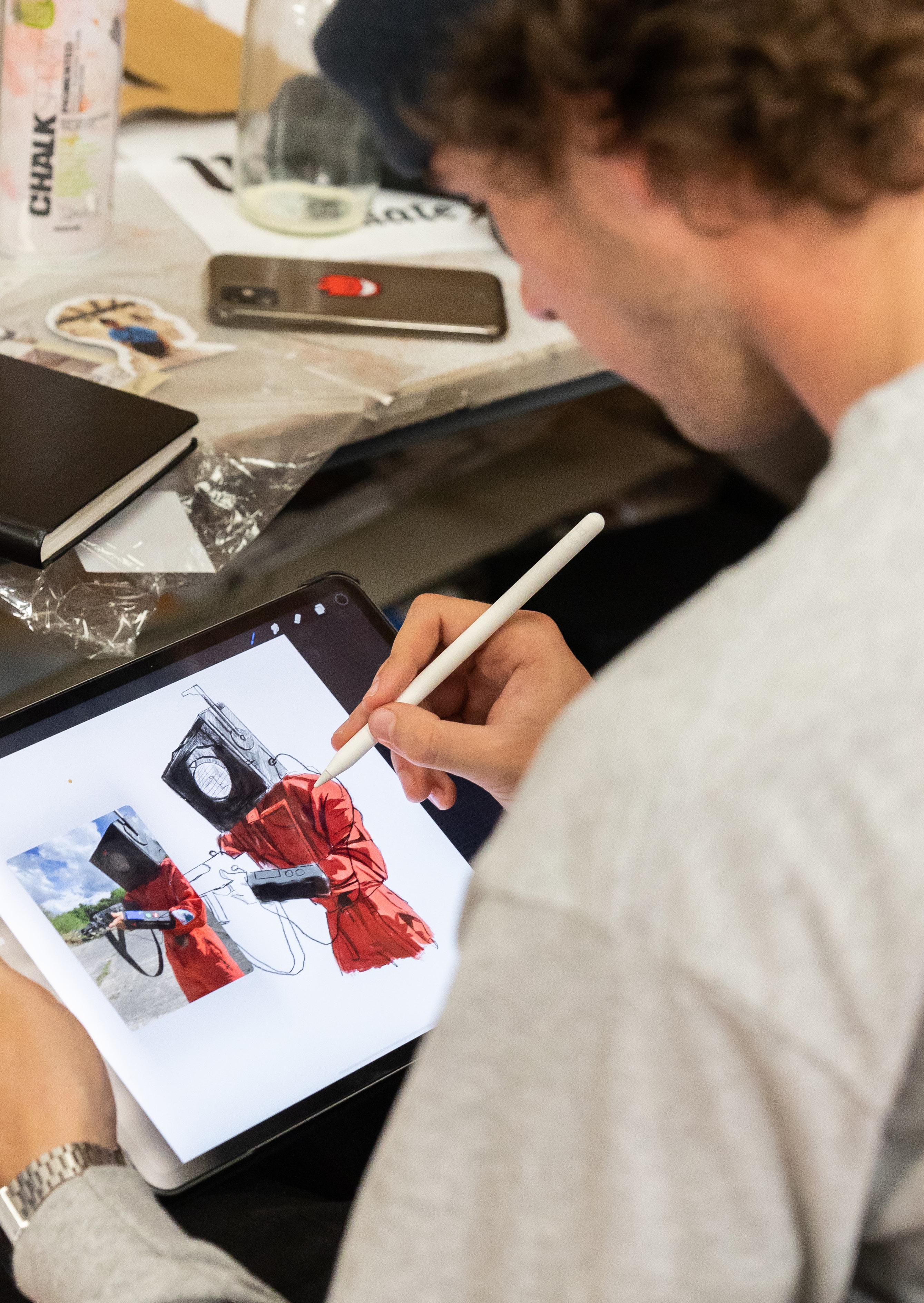
“STUDYING GRAPHIC DESIGN ALLOWS YOU TO LOOK AT ART IN A WHOLE NEW WAY”
HISTORY
What Are Lessons Like In This Subject?
What Will I Study?
Paper 1 - This unit assesses the rise and fall of the British Empire, allowing students to study in breadth issues of change, continuity, cause and consequence. The following themes are explored:
• Imperial policy.
• Expansion and Contraction of Empire.
• Trade and Commerce.
• Attitudes to Empire.
• Relations with indigenous peoples.
Paper 2 - Revolution and dictatorship: Russia, 1917–1953. This unit enables students to study Russia in depth, considering issues of political authority, the power of individuals and the inter-relationship of governmental, economic and social change.
• The end of Tsarism in Russia.
• The establishment of the Communist dictatorship.
• Stalin’s rise to power.
• Stalin’s rule in the 1930s.
• The Great Patriotic War.
The NEA – Tudor Rebellions, 1485-1569. The coursework requires students to investigate the Tudor century and assess the causes of rebellions against the five Tudor monarchs. Students will create and develop, through research, their own arguments and present these findings in an extended piece of critical writing.
Abi Wade
Castleford Academy
“My history lessons are incredibly interesting and engaging, allowing me to develop my critical thinking and research skills. Studying Britain’s imperial past has allowed me to appreciate the profound impact made by Britain on the modern world and the origins of our multi-cultural society.”
Studying AQA A-level History is challenging but fascinating, especially with topics like the British Empire, Revolution and Dictatorship (Russia), and the Tudors. You’ll explore how the British Empire expanded and impacted the world, examine revolutionary change in Russia from the fall of the Tsars to Stalin’s dictatorship, and study the political and religious shifts under Tudor monarchs. The course develops your analytical and essay-writing skills as you evaluate sources and interpretations. You’ll also complete a Non-Exam Assessment (coursework), allowing independent research. It’s a content-heavy subject, but ideal if you enjoy debate, understanding power and change, and linking past events to today. Qualification Title

LAW
What Are Lessons Like In This Subject?
Throughout the course, there is a variety of different teaching methods used to support learners’ knowledge and understanding. The lessons concentrate on varied retrieval techniques and group activities. The subject is taught using legal case law and students use this knowledge to apply to scenario-based activities. Due to the nature of the subject, discussions and debates occur often.
Learning is continued outside the classroom by regular visits to the local courts. Furthermore, we organise guest speakers including members of the legal profession and the National Crime Agency.
What Will I Study?
• English legal system: Criminal courts and lay people, legal profession, civil courts and funding.
• Criminal law: General elements, non-fatal offences, fatal offences, property offences, mental capacity defences and general defences.
• Law making: Legislation and delegated legislation, law reform, European law, judicial precedent and statutory interpretation.
• Tort law: Negligence, vicarious liability, occupier’s liability, torts connected to land and defences and remedies.
• Nature of law: Justice, society and morality.
• Human Rights: Human Rights Act 1998, articles under the European convention of human rights, enforcement and protection of human rights.
• 100% exam based.
• 3 exams at the end of 2 years.
• Exam Board: OCR.
Kyle Westwood
Carleton High School
“I enjoy studying law as it gives an insight into what goes on within the legal process, and also allows us to come up with our own opinions on the law by helping us evaluate certain legal areas.
Personally I love working on scenarios and applying knowledge we have gathered in class to them, as this is close to the work we may do as criminal lawyers.”
Qualification Title
Awarding Body

MATHEMATICS
What Are Lessons Like In This Subject?
Lessons start with retrieval practice: previous topics taught are consolidated using quizzes, skills tests, or exam questions. Exemplar models are worked through in the lesson to introduce new topics. Time is allocated to practising skills and application in problem solving. Students are encouraged to engage in discussion to deepen their knowledge. Mini whiteboards, card matching activities, interactive resources and web sites are used in lessons. Students become proficient in the use of a graphical calculator. Activities such as sketching graphs, solving simultaneous equations, carrying out statistical calculations and much more are performed in lessons on their calculator. Maths enrichment is on offer throughout the year. Examples include university trips to maths departments to experience maths lectures and student life; the opportunity to participate in the senior maths challenge and team maths challenge annually; and guest lecturers and speakers are invited into college to give inspiring maths talks.
What Will I Study?
The course will include:
• Proof.
• Algebra and functions.
• Coordinate geometry.
• Sequences and series.
• Trigonometry.
• Exponentials and logarithms.
• Calculus.
• Numerical methods.
• Statistics (including data, probability, binomial and normal distributions, and hypothesis testing).
• Mechanics (including vectors, kinematics, Newton’s laws, and moments).
Anna Grace Gilroy
St Wilfrid’s Catholic High School
“Studying A-level Maths has really developed my logical and analytic thinking skills. It is one of the best A-levels to develop problem-solving skills which are critical for the future of Science. We really get to expand our knowledge from GCSE and so far i have found it enjoyable to learn the more advanced mathematical concepts which at first seem so challenging.”
Qualification Title
A-level Mathematics
Awarding Body
AQA

MEDIA STUDIES
What Are Lessons Like In This Subject?
From TV to film, social media to podcasts, advertising to video games and everything in between - Media Studies plays a big part of our everyday lives. It’s never been so relevant to develop key skills in this industry.
The lessons in Media Studies will therefore help you to keep pace with this constantly changing and exciting industry. Lessons are based around exploring set products in class through analysis, research and debate. You’ll learn skills such as how to filter ‘fake news’, see how adverts are constructed to manipulate audiences and investigate the business side of the industry. You’ll also develop technical skills in how to use industry-standard equipment such as Apple iMacs, Adobe Creative Suite and camera equipment.
In addition to the course, you will experience talks with media employers and higher education providers and have the opportunity to go on trips to learn about the creative media industries.
What Will I Study?
You will explore a wide range of historical and modern media products through four key areas: media language, representation, industry and audience. You’ll get to study the following media industries:
• Television.
• Film.
• Online and social media.
• Advertising, PR and marketing.
• Magazines.
• Radio.
• Newspapers.
• Video games.
• Music videos
Holly Wilson
Crofton Academy
“Studying A-Level Media has enabled me to gain knowledge of theories and concepts needed to analyse a range of media products, including music videos, video games and movies. I have also been able to apply these skills within the production of my own media product as part of coursework which I have found particularly fun.”

MUSIC
What Are Lessons Like In This Subject?
A-level Music lessons are centred around developing musical knowledge and skills by analysing and discussing a wide range of music from 1750 to 2000. Performance skills are very important as they can form 35% of this course so this is a regular feature, as is composition where skills are built quickly through focused exercises and individual teacher feedback. All in all, music lessons are very busy!
We have a suite of practice rooms which can be used for private practice, instrumental and vocal teaching and developing composition ideas. In addition, we create compositions using a number of industry standard notation software packages and digital audio workstations. Student performances take place around college and within the local community. Trips to see professional concerts, musicals, and universities are arranged throughout the year. In addition, professional musicians and speakers regularly visit college to talk to our students.
What Will I Study?
The course also involves:
• Performance (25% or 35%). You will give a solo performance of between eight to twelve minutes in front of a visiting examiner.
• Composition (25% or 35%). You are required to create two compositions. One is a piece in the Western Classical tradition and the other is a free choice in any style.
• Listening and appraising exam is worth 40%. You will study the Classical and Romantic symphony, music of the early twentieth century and pop/ rock. Your knowledge will be tested through listening exercises, a range of analytical questions and an essay.
Tom Farrar
Ossett Academy
“A-Level Music has provided me with the skills to advance to the next stage of my musical career. I have developed my performance ability through practical work in lessons, as well performing in the whole college production. Composition has allowed me to create my own arrangements for orchestra, that I didn’t think was possible when I started the course. I have enjoyed studying the different setworks, and the aural and theory skills have gained and developed will be helpful as I progress to the RNCM. I would highly recommend A-Level music for anyone who is interested in a music career.”
Qualification Title
A-level Music
Awarding Body
EDUQAS

PHOTOGRAPHY
What Are Lessons Like In This Subject?
Photography lessons vary in teaching and learning methods and include a combination of practical workshops, 1:1 tutorials and independent project work. In Year 12 the course is structured to develop fundamental photographic skills which include; composition, exposure, traditional darkroom procedures, studio lighting techniques and digital editing using Adobe software. Practical work is informed by contextual research and critical analysis of other photographers work and recorded digitally and in physical sketchbooks. Students progressively explore their own independent photographic interests, selecting themes appropriate for their future career aspirations.
The Visual and Digital Arts department boasts professional standard studio spaces with Apple Macs, Adobe Creative Suite software, a darkroom and a photography lighting studio. It also has a wide range of other arts-based specialist tools and equipment to encourage students to explore multidisciplinary techniques. We operate an ‘open door’ policy to allow students to use the equipment and studio spaces independently outside of their lessons.
What Will I Study?
The course will include:
• Composition: How to frame an image and create visually exciting photographs.
• Digital photography: The functions of a digital camera.
• Digital manipulation: Use of Adobe applications to correct and alter images.
• Studio and location photography.
• Darkroom photography: How to use a traditional 35mm film camera and how to develop and print photographs.
• How to present your work creatively in both digital and hand-made sketchbooks.
• How to critique your work and that of others.
• How to best communicate concepts and/or meanings to your viewer.
Natasha Alty
Horbury Academy
“This course has helped me to to gain understanding in editing my own images and analysing other artists who have inspired me. I believe that this course has helped me to find my love for photography and improved my knowledge of different techniques.”

PHYSICAL EDUCATION
What Are Lessons Like In This Subject?
Sports psychology and skill acquisition PE lessons often require practical examples and so local community sports clubs are utilised for practical application of content eg. golf, squash or climbing. Exercise physiology lessons develop understanding of training, and so local community gym facilities are used to support this area of A-level PE eg. spinning, strength training or cardio sessions. One competitive sport is practically assessed and contributes 15% towards your final grade. Filmed evidence from college Wednesday afternoon fixtures is sent to the exam board as moderation evidence.
The full list of sports is available on the OCR A-level PE website and the list of sports is distinct and non-negotiable. You will take part in a practical moderation day annually at Hull university as part of this course alongside students from across the Trust. Classroom lessons have variety: physiology, biomechanics, psychology, history and sociology underpin the lesson content on A-level PE.
What Will I Study?
We study the OCR A-level Physical Education specification.
Paper 1
• Applied Anatomy and Physiology.
• Exercise Physiology.
• Biomechanics.
Paper 2
• Skill Acquisition.
• Sports Psychology.
Paper 3
• Social and cultural factors influencing sport.
• Contemporary influences in modern day sport.
Max Weatherill
Horbury Academy
“Studying PE helps me to understand more about my own health and the benefits of sport physically and mentally. For me, I love that the course allows us to combine the academics of sport and the practical parts to help us further understand the topic.”
Qualification Title
A-level Physical Education
Awarding Body
OCR
SCAN THE QR CODE TO FIND OUT HOW OUR SPORTS TEAMS PERFORMED IN OUR ANNUAL SPORTS REPORT

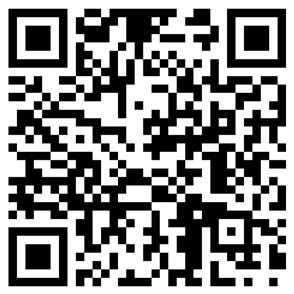
PHYSICS
What Are Lessons Like In This Subject?
New content is shared in small chunks to support students in their understanding. After the initial explanation, the understanding of the material is then deepened through problem solving, group work and analysing exam questions. Physics is a very hands-on subject so whenever there is opportunity to do so, the learning of new content is supported with demonstrations or practical investigations.
In addition to discovering new material, we will also spend part of our lessons on content that we have already covered. Retrieval practice is the most effective way to ensure that we are prepared for the examination, and this will be a part of every lesson.
What Will I Study?
Year 12
• Waves, including the strange things that happen when waves meet.
• Particles and radiation, including antiparticles, quarks and quantum phenomena.
• Mechanics and materials, including projectile motion and collisions.
• Electricity, including resistivity and superconductivity.
• Practical skills.
Year 13
• Further mechanics, including oscillations and circular motion.
• Thermal physics, including gas laws.
• Fields and their consequences, including electrical fields, capacitors, gravitational fields, orbits, magnetic fields and electromagnetic induction.
• Nuclear physics, our knowledge of the nucleus and its application.
• An optional unit, ‘Turning points in Physics’, which builds on a range of the physics studied in earlier sections.
• Practical skills.
Ignacy Nowak
“The Physics course goes a lot more in-depth about how and why interactions work than in GCSE and I love to know how something happens because if you’re able to see it happen outside the classroom, you can make connections which I find amazing. Also there are a lot of practicals, so you’re able to visualise the theory and be able to make a picture in your mind of what’s going on.”
Qualification Title

Minsthorpe Community College
POLITICS
What Are Lessons Like In This Subject?
Studying Pearson Edexcel A-level Politics is engaging, current, and debatedriven. The course covers UK politics and government, political ideologies (like socialism, conservatism, and liberalism), and global politics, including international relations and global institutions. You’ll explore how political systems work, how power is distributed, and how political decisions affect society. It’s ideal for students who enjoy following the news, debating issues, and thinking critically about democracy, rights, and global affairs.
Assessments are essay-based, so strong writing and argumentation skills are important. The content is dynamic and constantly evolving, making it a subject that feels relevant and thought-provoking.
What Will I Study?
Component 1: UK Politics
• Democracy and political participation.
• UK political parties.
• Electoral systems.
• Voting behaviour and the media.
• Core political ideas: conservatism, liberalism, and socialism.
Component 2: UK Government
• The constitution.
• Parliament.
• The prime minister and the cabinet.
• Relations between the branches.
• Non-core political ideas: nationalism.
Component 3: Comparative Politics: the USA
• The constitution.
• The presidency.
• Congress.
• The Supreme Court.
• Comparative approaches - how do US/UK politics compare?
Jack Salter
Ackworth School
“A Level politics did not change my views but helped me better understand my views and the world around me, providing me with the ability to articulate my own views.
The course has helped me develop my own understanding of politics and my skills of critical thinking and formulating judgements, especially in the volatile political climate we face in the UK/EU/US today.”
Qualification Title
A-level Politics
Awarding Body
EDEXCEL

PSYCHOLOGY
What Are Lessons Like In This Subject?
Psychology is the academic and scientific study of the brain, mind and behaviour. The role of biology, upbringing and culture on behaviour will be explored, and you will gain a greater understanding of why people act the way they do.
Whilst studying psychology, students may have the opportunity to experience talks from people who work in the field of psychology or to attend educational conferences with guest speakers. There will also be opportunities for students to enhance their learning experience by going on an a variety of trips, potentially including an overseas psychology trip.
Typical lessons include a range of activities where students work independently and collaboratively with others completing mini whiteboard tasks, exam questions and quizzes for example. All lessons involve students being active participants in their learning by taking part in class discussions and sharing thoughts and opinions about topics being studied.
What Will I Study?
• Paper 1 Exam - Memory, attachment in children, social influence (conformity and obedience), psychopathology (mental disorders).
• Paper 2 Exam - Approaches in Psychology (different perspectives), biological psychology, research methods used in Psychology.
• Paper 3 Exam - Schizophrenia, relationships, aggression, issues and philosophical debates in Psychology.
Alyssa Smith
Crofton Academy
“I found the topics within the course incredibly interesting, and the way my teacher presented the content and engaged with the class quickly grew my love for psychology and made it on of my favourite subjects.
The large range of concepts widened my knowledge, and were very fun to explore.”

RELIGIOUS STUDIES
What Are Lessons Like In This Subject?
Religion, Ethics and Philosophy (REP) is an exciting and challenging subject that provides an outstanding education in thinking and communicating. You will learn to evaluate and argue with precision, skills your future university and employer is looking for.
This course gives students an opportunity to ask and consider the ‘big questions’ in life such as, “is there a God?”; “how should we behave and what do the words ‘right’, ‘wrong’, ‘good’, ‘bad’ actually mean?” and “how should Christians practice their faith today”? It also encourages students to reflect on and develop their own values, opinions and attitudes.
We use detailed study packs which we have in class and independent activities. This allows us to spend time discussing, challenging and evaluating ideas, concepts and theories from all aspects of the course. This enables us to develop essential essay writing skills. The course is enhanced by talks by speakers from universities and religious and non-religious organisations.
What Will I Study?
• Religion. Christianity – religious figures, sacred texts, religious concepts, social and historical developments in religious thought, e.g. who was Jesus? What is God’s nature? Is Christianity relevant today? Christian attitudes to inequality. Religious practices.
• Ethics. Religious and secular theories about morality, e.g. utilitarianism, situation ethics and ethical egoism, and their application to issues, e.g. polyamorous relationships, capital punishment, immigration and animal testing. The debate about free will and determinism.
Josie Richardson
Horizon Community College
• Philosophy. Arguments for the existence of God and challenges to them from atheism, science and psychology. The problem of evil and religious responses. Religious experiences and the debate around religious language. “I enjoy studying Religion because it helps me understand different worldviews and connect what we learn to real world issues and ethical challenges. The subject encourages me to think in new ways and gives me the chance to hear and reflect on different perspectives and ideas about religion.”
Qualification Title
A-level Religious Studies Awarding Body
EDUQAS

SOCIOLOGY
What Are Lessons Like In This Subject?
In Sociology lessons, students engage in a range of learning activities including individual and group work, discussions and quizzes. Students are encouraged to discuss contemporary issues in society such as why people commit crime, or why social class affects educational achievement.
Sociology is a subject that develops critical and analytical thinking skills, so students are encouraged to read, analyse and discuss sociological research and theories.
Students are supported in developing their essay writing and evaluation skills. In addition, the department invites professional sociologists to talk to students about their research into society.
What Will I Study?
• Families and households: Changing patterns of family life, childhood, functions of the family, gender roles, and social policy.
• Education: Education policy, theories of the role of education in society, class, gender and ethnic differences in achievement.
• Media: Ownership and control, media representation, news, audiences, culture and globalisation.
• Crime and deviance: Theories of crime, social patterns of crime, victims, prevention and punishment, global crime.
• Research methods: Surveys, interviews, observation, secondary sources.
• Sociological theories: Sociological views such as feminism, functionalism and postmodernism.
Harry King
Minsthorpe Community College
“Sociology has given me a useful insight into the world around me, introducing me to concepts and ideas that have given me a new perspective.
I would recommend sociology to anyone interested in learning more about society who has an open-minded approach to understanding the beliefs of others.”

SPANISH
What Are Lessons Like In This Subject?
Spanish is taught in a specialist language room meaning students have plenty of IT access to facilitate independently controlled listening practice (as in the A-level exam) and pair-work speaking practice. Lessons cover the four main language skills: listening, speaking, reading and writing and are taught, as far as possible, in the target language. Grammar teaching is also integrated within the teaching of the A-level topics. In addition to the three lessons, students have a separate speaking session in a pair / individually to enhance fluency and confidence in this skill area.
We offer students an opportunity to visit Spain during their course to further develop their cultural knowledge and linguistic competence. Students can participate in many Enrichment opportunities relating to cultural experience, languages in Higher Education and the world of work. Spanish A-level students can always expect lessons to be fun and relaxed yet challenging and supportive with a consistent focus on the teaching and learning needed in order to get students to where they need to be.
What Will I Study?
Students will study topics from a range of political, social and cultural themes all in relation to the Spanish-speaking world following the AQA A-level course:
• Traditional and modern values.
• Cyberspace.
• Equality of the sexes.
• Influence of idols.
• Regional identity in Spain.
• Cultural heritage.
• Immigration.
• Racism.
• Coexistence.
• Young people today, citizens of tomorrow.
• Monarchies and dictatorships.
• Popular movements.
In addition, students study a film and a book, and carry out an independent research project which forms a major part of their final A-level oral exam.
Daisy Varzea
Oulton Academy
“If you want to look at how different debates and conflicts impact the Spanish speaking world, I would definitely recommend this course. Studying Spanish at A-Level means learning not only the language but also the culture and the context surrounding Spain and Latin American countries. I have enjoyed developing my current skills - language as well as transferablethrough the interactive lessons, weekly speaking sessions and feedback and I’m confident that I’ll be able to apply these skills in the future.”
Qualification Title
A-level Spanish Awarding Body

TEXTILES & FASHION DESIGN
What Are Lessons Like In This Subject?
You will work in a welcoming, creative, open studio environment. Experiencing both traditional and contemporary Textile and Fashion Design processes. You will nave access to industry standard Mac suites, weaving looms, sewing machines and screen-printing equipment alongside a range or experimental processes and materials across the Visual Arts department.
You will engage with live briefs, thinking like a designer in industry, from the ideas generation stage, client profiling, and design ideas through to the production of final garments and exhibition pieces. You will have talks from practitioners working in the textiles industry, to help your progression into creative degrees and job roles. You will also have a direct progression route onto our Foundation Art and Design Diploma based at the NCLT Trust HQ in Normanton, West Yorkshire.
What Will I Study?
• Observational drawing.
• Fashion illustration.
• Garment construction.
• Mark-making.
• Fabric manipulation.
• Embroidery.
• Weave and knit.
• Collage.
• Printmaking.
• Experimental textiles.
• Felt-making.
• Concept building and contextual research.
• Portfolio presentation.
• Time management and problem-solving skills.
• Presentation skills.
Clarke Miles Moffat
The Kings School
“The course has given me a much wider insight into the textile and fashion industries . Another benefit of this course is how there are so many routes which it allows you go down which is very comforting and also exciting . Lastly, another good thing about this course is how explorative it can be and how many techniques and skills you will learn.”
Qualification Title
A-level Art and Design (Textile Design)
Awarding Body
EDUQAS

APPLIED GENERAL REQUIREMENTS
- Grade 4 in GCSE Visual Arts subject or L2 Merit in a BTEC equivalent. If a creative subject has not been studied, a portfolio will be required - Grade 4 in English Language
in English Language
4 in English Language
- Grade 4 in English Language
4
- Grade 4 in English Language - Grade 4 GCSE Visual Arts subject or L2 Merit in a BTEC equivalent If a GCSE Visual Art subject or BTEC equivalent has not been studied, a portfolio will be required for consideration.
*This qualification is currently subject to a process of review and reform by the Department for Education.
If there are any changes to this qualification following your interview for a place at the college, we will be in touch to discuss possible alternative, but related, qualifications.
- Grade 4 in English Language
- Grade 5 in Mathematics
- Grade 5 in Biology and Grade 5 in one other GCSE science or 5-5 in GCSE Combined Science
- Grade 4 in English Language - Grade 4 in GCSE Music (if studied) or L2 Merit in a BTEC equivalent (if studied), plus an
- Grade 4 in any two GCSE Sciences or 4-4 in GCSE
- Grade 4 in English Language - Grade 4 in
- Grade 4 in English Language - Grade 5 in
- Grade 4 in English Language
- Grade 4 in GCSE PE (if studied) or L2 Merit in a BTEC equivalent (if studied)
- Grade 4 in English Language
- Grade 4 in GCSE PE (if studied) or L2 Merit in a BTEC equivalent (if studied)
- Grade 4 in English Language
- Grade 4 in GCSE PE (if studied) or L2 Merit in a BTEC equivalent (if studied)
- All students must have completed a minimum of 5 GCSE qualifications.
- All GCSE qualifications contribute to the average GCSE point score.
- GCSE Maths re-sit is required for any students with sufficiently strong GCSE results who have not yet achieved a grade 4 in GCSE Maths.
- Level 4 in GCSE English Language is a minimum entry requirement for all our courses. Some courses may require higher than level 4.
ART & DESIGN PRACTICE
What Are Lessons Like In This Subject?
We have industry standard facilities within the Visual Arts department, such as Apple Mac computers with access to Adobe software, screen printing, laser cutting, textiles machinery and much more. Our specialist team of staff will run workshops and guide you through everything we have to offer. We aim to enrich your experience with trips and visits to exhibitions in places such as London and Manchester.
We have guest speakers from the creative industries and leading universities and strong links with our foundation diploma. Workshops with practicing artists will increase your confidence in using specialist media such as oil paints.
What Will I Study?
• Drawing techniques.
• Painting.
• Colour theory.
• 3D design.
• Print techniques.
• Photography.
• Textiles.
• Composition.
• Digital media.
You will carry out a range of research and explore the work of practicing artists. Your research, investigation and exploration of ideas will be recorded in creative sketchbooks.
Bupe Mwaba
Oulton Academy
“What’s good about BTEC Art is that you get to learn a lot of art styles ranging from different types of painting to even something like graphics work or even just photography techniques like light drawing.”
Qualification Title
BTEC Extended Diploma in Art & Design Practice
Awarding Body
BTEC

BUSINESS
What Are Lessons Like In This Subject?
In BTEC Business, we ensure that our lessons allow opportunities for learners to practise developing employability skills. Lessons build on real-life examples to help learners see theory in practice.
In the past, we have had guest speakers from Morrisons and have also visited Cadbury World, Hull University and the Bank of England in London to further learners’ knowledge and understanding of the business world.
We have a range of IT suites to use for lessons and Microsoft Teams will be used as a library of resources to help aid independent learning in this subject.
What Will I Study?
The course contains both exams and coursework units, involves both theory and practical application and covers a wide range of topics including:
Mandatory examples:
• Exploring business.
• Developing a marketing campaign.
• Personal and business finance.
• Recruitment and selection.
Beth Toon
The King’s School Pontefract
“When studying BTEC Business, it has allowed me and other students to gain an insight into how a business runs and helps understand the “behind closed doors” of a business that you wouldn’t know existed.
It also helps people understand the importance of money and spending money in an appropriate way in order to manage yours and finance of others.”
Qualification Title
BTEC Extended Certificate in Business
Awarding Body
BTEC

BUSINESS (DOUBLE)
What Are Lessons Like In This Subject?
Students in this BTEC Diploma cover the same units as the Extended Certificate course, but spend more time exploring financial aspects of running a business, giving them a deeper understanding of real-world challenges like managing cash-flow. Additionally, we also explore some specialist topics in greater detail, such as managing an event, principles of management and international business. These will link to real-life case studies, and will provide students with transferable skills which will help you develop your employability.
Guest speakers, visits to businesses and trips to universities are a key part of the delivery of the course, and have in the past included visiting Cadbury World, Hull University and the Bank of England.
Lessons often involve using the college’s IT suites and software packages, which will add to your list of transferable skills, and there will be a significant element of independent learning required.
What Will I Study?
The course contains both exams and coursework units, involves both theory and practical application and covers a wide range of topics including:
• Exploring business.
• Developing a marketing campaign.
• Personal and business finance
• Recruitment and selection.
• International business.
• Principles of management.
• Managing an event.
• Pitching a new business
Beth Toon
The King’s School Pontefract
“When studying BTEC Business, it has allowed me and other students to gain an insight into how a business runs and helps understand the “ behind closed doors” of a business that you wouldn’t know existed. It also helps people understand the importance of money and spending money in an appropriate way in order to manage yours and finance of others.”
Qualification Title
BTEC Diploma in Business Awarding Body
BTEC

BUSINESS (TRIPLE)
What Are Lessons Like In This Subject?
In this course, students dedicate their entire timetable to studying business, which provides a great opportunity to explore a wide range of issues and contexts relating to running a company in the real world.
The Extended Diploma covers the same material as the Diploma, but also explores additional units, such as decision making in business. This explores how business leaders analyse, compare and evaluate a wide variety of data to enable them to make informed choices about how best to grow and manage their company. The course will help explore different models for making evaluative judgements about business data, as well as exploring some of the security and legal issues connected to gathering data, such as data storage and GDPR. This will in turn provide you with a more in-depth understanding of the demands on business owners, helping better prepare you for the world of work. As with the Extended Certificate and Diploma courses, past students have had a wide variety of subject enrichment on offer such as visiting speakers, trips to businesses and visits to university departments. Students will also be expected to develop their own independent learning skills, using the college’s IT suites and Learning Resource Centre to complete work outside of the classroom, helping to develop IT skills and a level of responsibility, both of which will make students highly employable.
What Will I Study?
The course contains both exams and coursework units, involves both theory and practical application and covers a wide range of topics including:
• Exploring business.
• Developing a marketing campaign.
• Personal and business finance.
• Recruitment and selection.
• International business.
• Principles of management.
• Managing an event.
Beth Toon
• Pitching a new business.
• Business decision making.
• Team building in business.
• Customer service.
• Market research.
• Work experience.
“When studying BTEC Business, it has allowed me and other students to gain an insight into how a business runs and helps understand the “ behind closed doors” of a business that you wouldn’t know existed. It also helps people understand the importance of money and spending money in an appropriate way in order to manage yours and finance of others.”
Qualification Title
BTEC Extended Diploma in Business
Awarding Body
BTEC

The King’s School Pontefract
CREATIVE MEDIA
What Are Lessons Like In This Subject?
Lessons focus on the analysis of media texts and production techniques, understanding the way meaning is created. You will also develop the specialist creative skills necessary to create media products.
In Year 12, lessons will mainly focus on the analysis and exploration of existing media texts. Through a mixture of lesson materials, teacher delivery and independent work, you will learn how to deconstruct media texts and apply relevant theory. There will also be some opportunities to develop your creative production skills.
In Year 13, you will select to focus on either film production or magazine production, producing and planning a significant piece of creative work.
What Will I Study?
• Media Representations: An external assessment in which you will analyse a variety of media products. You will explore how meanings are created, how representations are constructed and how audiences interact with products. As preparation for this exam, you will explore media areas such as film, television, magazines, advertising, and video games.
• Pre-Production Portfolio: You will produce professional planning materials which are required in the creative media industries for your major project.
• Film Production or Magazine Production: You will choose to create your very own major production project, specialising in film or magazine.
• Responding to a Commission: A task set by the exam board which will require you to plan and construct materials for a media production in timed conditions.
Katie Olivia Ball
Campsmount Academy
“This course allows you to develop your creative skills as well as developing knowledge about production in film which gives variation compared to other courses. I like studying this course because it contains interesting content which keeps me engaged and there are media production opportunities where you can make your own media products as part of the coursework.”
Qualification Title
BTEC Extended Certificate in Creative Digital Media Production
Awarding Body
BTEC

CRIMINOLOGY
What Are Lessons Like In This Subject?
In Criminology lessons, students participate in a variety of learning activities as they progress through the course. Lessons include a range of teaching methods to support students in their learning, including independent research and group discussion and tasks. Students learn how the criminal justice system operates and investigate a number of case studies of crimes in society.
For the controlled assessments, students carry out extensive independent research and write a detailed report. This includes planning a campaign to raise awareness of crime in the first year and studying the process of crime investigation from the crime scene to the courtroom in the second year.
Students maintain a detailed folder of class resources and notes to prepare them for both forms of assessment used in this course - report writing and exams.
What Will I Study?
• Changing awareness of crime: Types of crime, media and crime, official data on crime, crime prevention and awareness campaigns. (Year 1 Controlled Assessment).
• Criminological theories: Theories of criminality from biology, psychology and sociology. (Year 1 Exam).
• Crime scene to courtroom: The criminal justice system from investigation to verdict, personnel and techniques involved in criminal investigations and courtroom procedures. (Year 2 Controlled Assessment).
• Crime and punishment: Law-making, criminal justice, forms and functions of punishment. (Year 2 Exam).
Elizabeth Wilkinson
Horbury Academy
“Criminology has given me a greater understanding of crime within our society and has encouraged me to pursue a career within the police force.”
In addition, students can benefit from guest speakers who work in the field of crime and criminal justice. Qualification Title

DANCE PERFORMANCE
What Are Lessons Like In This Subject?
Students study a range of dance genres and critically appreciate and analyse a range of professional works which supports their development and understanding.
Alongside this students enhance their dance technique and choreography skills which are assessed in a performance environment. Lessons are engaging and dynamic allowing students to explore their own creative vision.
During the course, students have the opportunity to work with professional artists through workshops, see a range of live performances, compete in regional dance competitions and also have the opportunity to gain an insight to the professional dance world through the annual trip to Move it.
What Will I Study?
• Group performance workshop.
• Jazz dance technique.
• Choreography for live performance.
• Contemporary technique.
• Developing skills and techniques for performance
Owen Michael Birtles
Campsmount Academy
“This course makes you develop skills whilst gaining knowledge of practitioners who have made the style of dance develop over time.
Not only is this course a good way to show your creativity off, but it also gives you the freedom to become versatile in many different styles of dance.”
Qualification Title
BTEC Extended Certificate in Performance (Dance)
Awarding Body
BTEC

DIGITAL DESIGN & COMMERCIAL PHOTOGRAPHY
What Are Lessons Like In This Subject?
In Year 12, the course is structured to develop a variety of skills in both digital design and photography. In Year 13, you will specialise and develop one personal and in-depth body of work. Students are encouraged to develop their skills in research, problem solving, collaboration, independent thinking, professionalism and marketing. Students will also understand the potential of self-employment and creative entrepreneurship. Students could expect to continue into professions such as marketing and communications, graphic design, digital media production, games design, photography, art-working or retouching, and more. The Visual and Digital Arts department has professional-standard spaces with Apple Macs, drawing tablets, a photography studio, DSLR cameras and other equipment for student use. It also has a wide variety of other arts-based specialist equipment to encourage students to explore multidisciplinary techniques. We operate an ‘open door’ policy to allow students to use the equipment and studio spaces independently outside of lessons.
What Will I Study?
Over the course, you may study topics and skills such as:
• Adobe CC (Photoshop, Lightroom, Illustrator).
• Digital photography; the functions of a digital camera.
• Studio and location photography.
• Flash and lighting.
• Composition and layout.
• Colour and typography theory.
• Branding and logo design.
Saniya Nadeem
Manchester Enterprise Academy
• Social media and marketing.
• Editorial design.
• Experimental image editing and manipulation.
• Creative business and freelancing skills.
• Visual and contextual research.
• Idea generation and working to a set brief.
• Critiquing your own work and that of others.
“This course has allowed me to apply and develop my creative skills on a wider perspective. I really enjoy creating physical artworks such as cyanotypes, lumen prints and anthotypes as well as digital work, such as editing photoshoots taken. Also, understanding the work of other artists by researching about their background and how they have gotten to this position such as their form of inspiration. They therefore have a unique perspective of interpreting their form of art and their work in turn influences the art industry positively, creating a more diverse area for new artists.”

*NEW COURSE FOR 2026
EARLY CHILDHOOD DEVELOPMENT
What Are Lessons Like In This Subject?
The Extended Certificate is for individuals interested in learning about the children’s care and education sector (0-8 years) with a view to progressing to a wide range of higher education courses and employment/training.
Progression Routes
• Nursing – Child – BSc (Hons).
• Teacher Training – Childhood and Early Years Studies BA (Hons).
• Social Work – BA (Hons) Social Work
• Psychology – Psychology BSc (Hons).
What Will I Study?
The qualification has four mandatory units covering the following topics:
• Children’s development.
• Keeping children safe – Health and safety and safeguarding responsibilities.
• Play and Learning.
• Research & Reflective Practice.
Qualification Title
BTEC Extended Certificate AAQ in Early Childhood Development
Awarding Body
BTEC

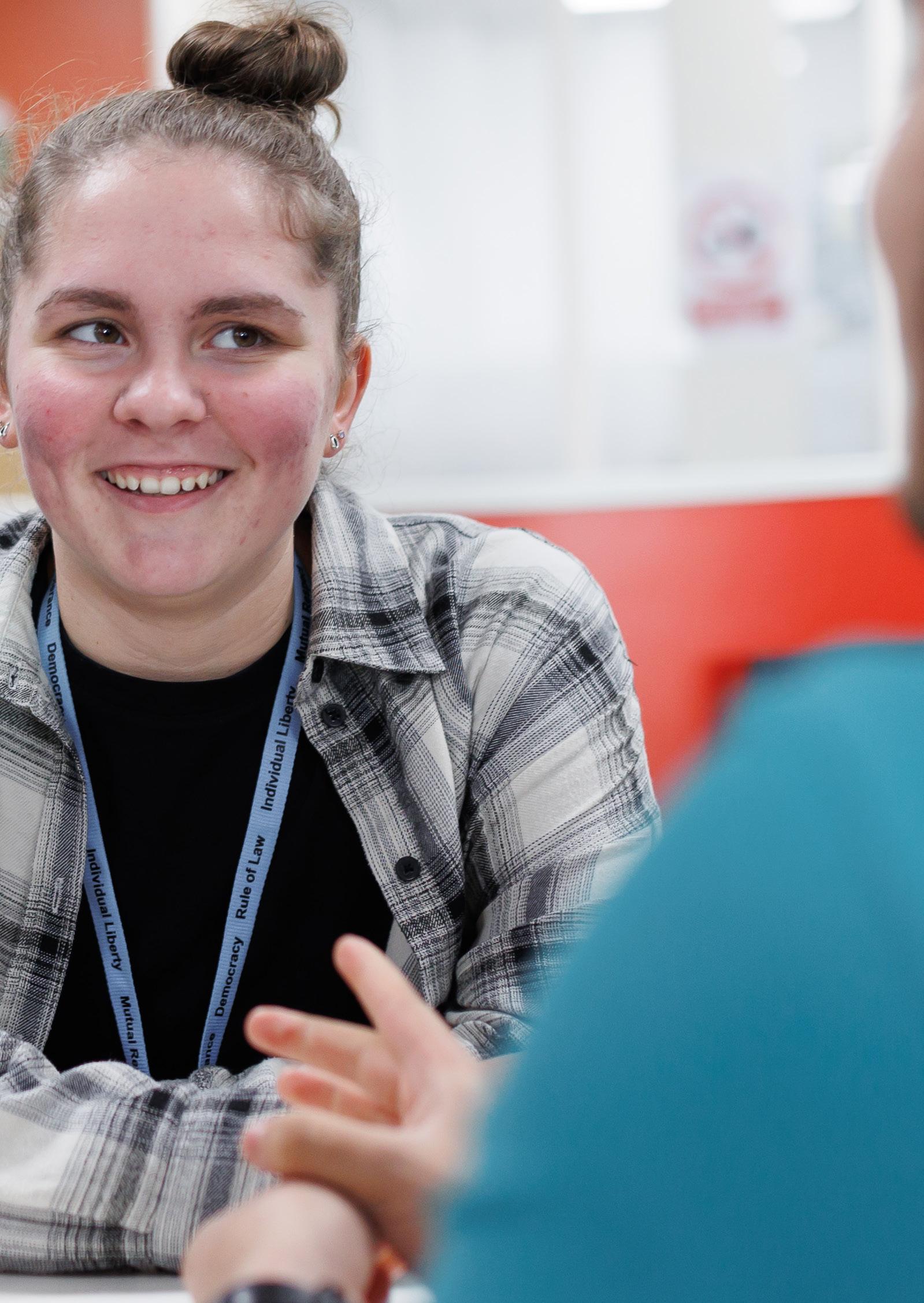
*This qualification is currently subject to a process of review and reform by the Department for Education. If there are any changes to this qualification following your interview for a place at the college, we will be in touch to discuss possible alternative, but related, qualifications.
“LESSONS
IN CHILDREN’S PLAY, LEARNING AND DEVELOPMENT ARE
ENGAGING, PRACTICAL, INTERACTIVE, AND RELEVANT.”
EARLY YEARS
What Are Lessons Like In This Subject?
The qualification is for you if you are considering a career as a pre-school early years co-ordinator, health visitor assistant, child minder or nursery nurse as well as the previously mentioned occupations. The content may be applied during delivery in a way that is relevant to local employment needs and as a result placements have been established within the local area. As part of the course, you will be required to attend at least one work experience setting for a minimum of 50 hours during the 2-year course. This setting should be working with children aged from birth to seven years and 11 months. This will allow you to work alongside professionals and help you to develop your specialist skills.
There is a mixture of both internal and external assessment. Lessons in Children’s Play, Learning and Development are engaging, practical, interactive, and relevant. Students enjoy visits to local play centres, pre-schools, primary schools, childminders, and nurseries. The qualification is designed to support and enhance progression to higher education when taken as part of a programme of study that includes other appropriate Applied General or A-level qualifications.
What Will I Study?
You’ll study a range of topics, including:
• Children’s Development: learn about the theories and models of child development, including how this relates to the Early Years Foundation Stage, and the short-term and long-term effects of factors that affect child development.
• Children’s Communication, Literacy and Numeracy: learn about how children develop these skills and how to plan activities in exciting and interesting ways that help to develop their ability to process information and interact with others.
• Children’s Play and Learning: learn about the types of play and how this supports their learning and development, including the theoretical perspectives and curriculum approaches that have been developed over many years and how they influence practice in early years settings.
Jessica Phoenix
De Lacy Academy
“I like this course because it’s fun and I get to have the opportunity to do work experience throughout the two years that helps me to feel prepared for when I leave college, it also helps me to learn a lot through the experiences and learn how children act.”
Qualification Title
T-LEVEL Education and Early Years
Awarding Body
NCFE

GAMES DESIGN
What Are Lessons Like In This Subject?
Through a series of practical workshops and creative projects, you will develop the skills required to work towards a career in the games industry. Some of the things you will cover in lessons are 3D modelling software, how to use a game engine, 2D animation techniques and sound production for games. As well as this, you will work on researching, developing and pitching ideas for your own projects.
Lessons are a combination of practical, teacher-led workshops, theoretical delivery and creative project work. Sometimes you might be working in small groups but much of the work is done independently. We also have links with local games designers who will give you feedback on your ideas. We also visit games expos to see the latest innovations and universities to explore what degree courses are available in games design.
What Will I Study?
Diploma and Extended Diploma:
• A1: Skills Development – You will explore and develop different media skills relating to games design, e.g. digital graphics, 3D and 2D animation, sound.
• A2: Creative Project – In response to a brief, you will plan, develop and produce a media product, applying the skills you learned in A1.
Ren Green
Holy Family Carlton
“This course provides people with an opportunity to understand what the game industry entails, and why it’s a good career to pursue. This course delves into the basics of Unreal Engine, Maya, Photoshop, and Blender. These are the tools of the trade, and knowing how to use these would help propel a person into a good game design career.
As well as this, it also teaches you how to look for common tropes in games and how to spot them.”
Qualification Title
BTEC 540 Diploma in Creative Digital Media Practice (Games Design)
Awarding Body
BTEC

GAMES DESIGN (TRIPLE)
What Are Lessons Like In This Subject?
This course offers you a series of creative and practical tasks, exploring areas such as 3D modelling, using a game engine and developing 2D animation, all of which will help you develop the requisite skills needed to pursue a career in the industry. The course will help you explore different career pathways in games design, such as understanding different working practices, considering higher education opportunities and developing portfolios of work.
As well as this, you will work on researching, developing and pitching ideas for your own projects. Lessons are a combination of practical, teacher-led workshops, theoretical delivery and creative project work. A lot of this project work will require you to be organised, develop your own production schedules and manage your own workload. We also have links with local games designers who will give you feedback on your ideas as well as visiting games expos and universities to see the latest innovations and explore what degree courses are available in games design.
What Will I Study?
• A1: Skills Development – You will explore and develop different media skills relating to games design e.g. digital graphics, 3D and 2D animation, sound.
• A2: Creative Project – In response to a brief, you will plan, develop and produce a media product, applying the skills you learned in A1.
• B1: Personal Progression – You will explore career opportunities, produce materials to help in your career development and research potential pathways into the games industry.
• B2: Creative Industry Response – This is the major project of your two-year course. It is similar to the A2 Creative Project but should be much bigger in terms of its ambition and scale and should demonstrate a sophisticated understanding and use of practical skills.
Phoenix Smith
Brigshaw High School
“The course provides a lot of creative freedom for what you create for the assignments. And you get to collaborate with your peers and come up with fun ideas. The course is extremely fun and the PCs are state-of-the-art.”
Qualification Title
BTEC Extended Diploma in Creative Digital Practice (Games Design)
Awarding Body
BTEC

HEALTH & SOCIAL CARE
What Are Lessons Like In This Subject?
The BTEC National in Health and Social Care (Extended Certificate) is an Alternative Academic Qualification (AAQ) designed for post-16 students with an interest in Health and Social Care and aiming to progress to higher education, higher level apprenticeships or full-time work in the care sector. Students will develop knowledge and skills throughout this qualification that are key to Health and Social Care related careers, such as organisation and critical thinking, communication, empathy and compassion skills.
This qualification allows students to engage in various aspects of the Health and Social Care sector, as well as gaining an understanding of developmental milestones and developing knowledge on the organisation, structure and normal physiological functioning of the human body. Students are offered trips and courses to enrich their understanding of theory, practice and career pathways, as well as the opportunity to complete a work placement in a Health and Social Care setting. Embedding work placements into the curriculum gives students a more broad and rich experience and provides them with the knowledge and skills needed to progress into careers such as nursing, midwifery, primary teaching and social work.
What Will I Study?
The units that you will complete over the two years of study are:
• Human lifespan development (external exam).
• Human biology and health (external exam).
• Health and Social Care practice (internal coursework unit).
• Promoting health education (internal coursework unit).
Lily Robinson
Carleton High School
“This course was very interesting and fun to learn, All teachers are very helpful and supportive and the collage provides many helpful experiences such as work experience and looking into all aspects of health and social care. It really shows you how our NHS runs and how we as people can care for people in our community and provide support to people in need. I really enjoy this course and would choose it again and again as my choice subject.”
Qualification Title
BTEC Extended Certificate AAQ in Health & Social Care
Awarding Body
BTEC

MENTAL HEALTH
What Are Lessons Like In This Subject?
Lessons are designed to be engaging and practical, combining theory with real-world application. You’ll explore mental health from multiple perspectives, discuss case studies, and use monitoring tools to assess wellbeing. Activities include reflecting on strategies to improve outcomes, promoting resilience, and creating mentally healthy environments.
The focus is on interactive learning that prepares you to apply knowledge in education, healthcare, social care, and everyday life. This course is assessed through a combination of coursework and examinations.
What Will I Study?
• Fundamentals of mental health and the individual
• Supporting and promoting mental health in organisations
• Mental health, wellbeing and society
• Community-based support for mental health and wellbeing
You’ll learn about the wide range of influences on mental health-lifestyle, environment, social and psychological factors-and examine their impact on wellbeing. The course also introduces practical strategies for early support and resilience building.
This course may be a very good option alongside BTEC Extended Diploma in Health and Social Care, particularly for students that were previously considering the double or triple health and social care course. Those double and triple courses have been discontinued by the government.
Qualification Title
Level 3 Extended Certificate in Mental Health: Individuals and Society Awarding Body Cambridge OCR

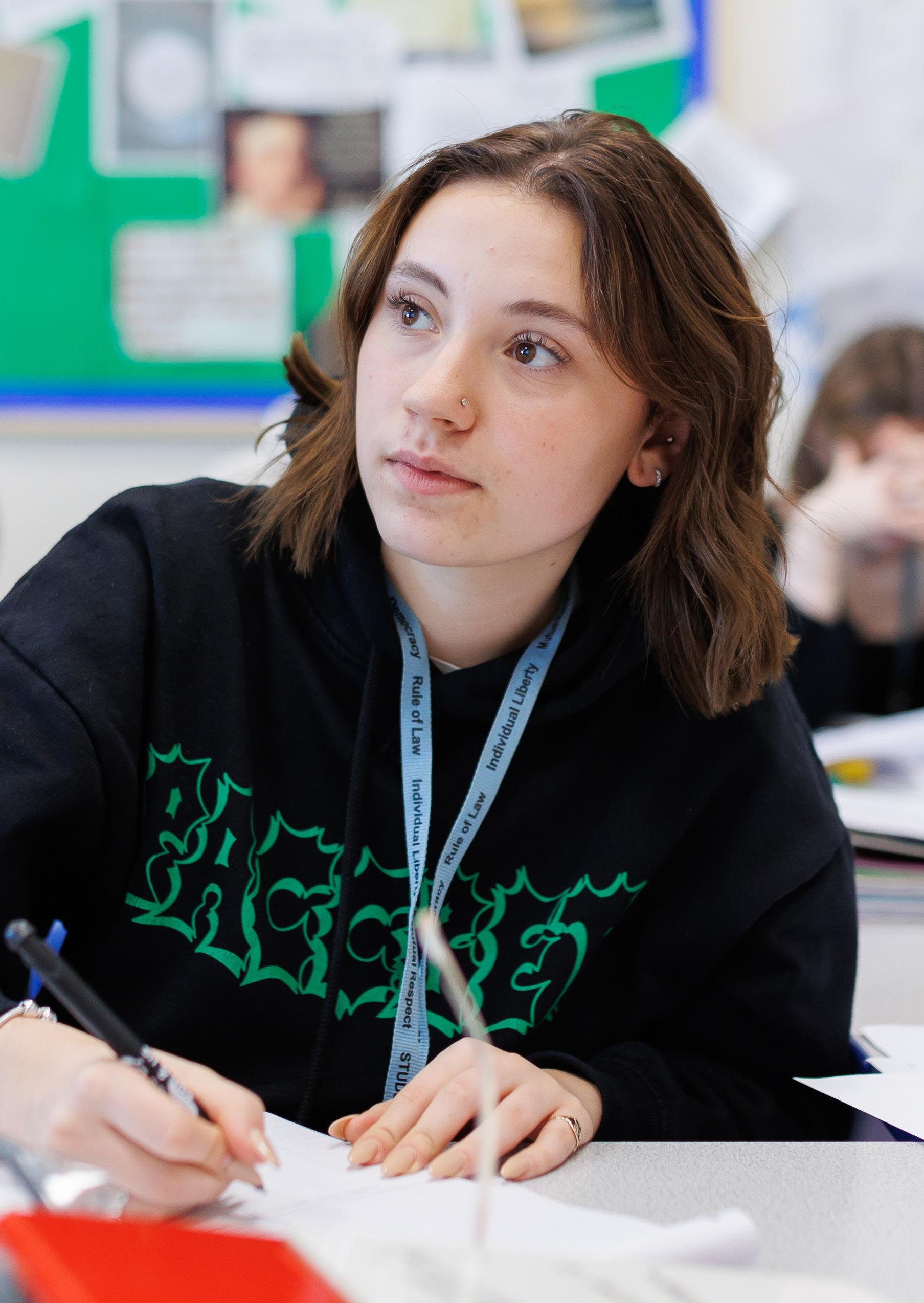
IT
What Are Lessons Like In This Subject?
The exciting new IT qualification has evolved to better link to the industry it aims to develop learners for, including the fast-paced field of cyber security. Students who study with us will develop a strong understanding of how IT supports the function of business and how to develop solutions with key stakeholders in mind.
A range of teaching and learning methods are employed in this course, from teacher led activities, to paired and group work, practical activities and workshop-style sessions for evidence gathering. Students will be working on industry standard hardware and software, for example, Microsoft Office and Adobe Creative Suite, to develop their project work.
Links to the IT industry exist with talks by specialists in cyber security and networking as well as visits to local businesses. University trips and talks are included over the two years, meaning IT students are well-prepared to progress in the field of IT and computer science.
What Will I Study?
The course is made up of four units, two of which are externally assessed through exams and make up two thirds of the course. These are:
1. Information Technology systems.
2. Cyber security and incident management.
The other two units are internally assessed through coursework and are worth the final one third of the course. These are:
3. Website development.
4. Relational database development.
Jacob Vincent Halkyard-Jones
Outwood Academy Freeston
“This course is good as it is a mix between course work and assessments which allows there to be a good mixture of what is being taught with a lot of practicals allowing me to get real experience in the field of IT.”
Qualification Title
BTEC Extended Certificate AAQ in IT
Awarding Body
BTEC

IT: CYBER SECURITY
What Are Lessons Like In This Subject?
The AAQ in Cyber Security is designed for learners who want to understand how modern organisations protect their systems, data and people from digital threats. Students explore how cyber-attacks happen, why systems are vulnerable, and what businesses do to prevent, detect and respond to incidents.
Lessons combine teacher-led theory, hands-on practical investigation, simulated security scenarios and guided research tasks. Students work with real examples of cyber breaches, analyse vulnerabilities, and practise applying industry-relevant processes such as risk assessment, secure system configuration and incident response planning.
The course also introduces learners to wider themes such as social engineering, digital forensics, secure networking and the legal responsibilities surrounding data and digital behaviour. Links to universities and employers in the digital sector help students prepare for further study in cyber security, computer science, digital forensics or wider IT roles.
What Will I Study?
The Extended Certificate is made up of five units. Two units are assessed externally through exams, with the remaining three assessed internally through practical coursework and investigative projects.
Externally Assessed Units (Exams) - These units provide the core technical understanding behind cyber security.
1. Fundamentals of Cyber Security - You will explore different types of cyber threats, system vulnerabilities, attack methods and the principles behind securing modern networks and devices. You’ll also examine legislation, ethical considerations and the impact of cyber-attacks on individuals and organisations.
2. Cyber Security Incident Management - This unit focuses on how organisations prepare for, respond to and recover from cyber incidents. Students learn about incident detection, containment strategies, communication protocols and post-incident review processes used by professional security teams.
Internally Assessed Units (Coursework / Practical Projects) - These units develop applied skills used in real cyber-security work. Some possible areas of study include:
3. Security Testing and Vulnerability Assessment - Students carry out practical investigations to identify weaknesses in systems and networks. This includes analysing risks, selecting appropriate tools and recommending improvements to strengthen security.
4. Digital Forensics and Evidence Handling - This unit explores how digital evidence is collected, preserved and examined following an incident. Students learn basic forensic techniques and consider what different types of data can reveal about cyber activity.
5. Secure System Design - Students design and justify a secure system or solution for a given scenario. This includes proposing appropriate controls, addressing user needs, and evaluating how effectively the solution mitigates identified threats.

IT: DATA ANALYTICS
What Are Lessons Like In This Subject?
The new AAQ in Data Analytics prepares learners for a world where decisions in business, government, healthcare, retail and entertainment are driven by data. Throughout the course, students explore how organisations collect data, transform it into meaningful information, and use it to solve real-world problems-from predicting trends to improving digital services.
Lessons include a blend of teacher-led theory, practical analytical workshops, paired tasks and independent project work. Students will work with industry-relevant tools to prepare datasets, create dashboards and present insights visually to meet client needs.
University links, employer projects and applied industry contexts support students to progress into digital, business and computing pathways.
What Will I Study?
The Extended Certificate is made up of five units. Two units are assessed through external exams, with the remaining three assessed internally through coursework and practical project work.
Externally Assessed Units (Exams) - These focus on core analytical principles, digital systems and the use of data in society.
1. Fundamentals of Data Analytics - Understanding how data is collected, stored, secured, analysed and presented, including the use of big data, data formats, legislation and ethical handling.
2. Big Data & Machine Learning - Exploring large-scale data ecosystems, how organisations use AI and machine learning to process information, and the challenges of managing data at scale.
Internally Assessed Units (Coursework / Practical Projects)These focus on developing applied technical skills.
3. Spreadsheet Data Modelling - This unit focuses on using spreadsheet tools to organise, manipulate and analyse data. Students create models that test scenarios, automate calculations and present findings through charts and visual outputs, helping organisations make informed decisions from complex data sets.
4. Data and the Internet of Everything (IoE) - This unit explores how connected devices collect, process and share data across networks in sectors such as healthcare, smart homes, transport and environmental monitoring. Students learn how IoE systems are designed, including device selection, communication methods and how data is used to deliver automated services and real-world solutions.
5. Data and Digital Marketing - This unit looks at how organisations use data to plan, run and evaluate digital marketing campaigns. Students work with real marketing data to create visual outputs, gaining insight into audience behaviour, engagement metrics and how data-driven decisions shape effective digital strategies.

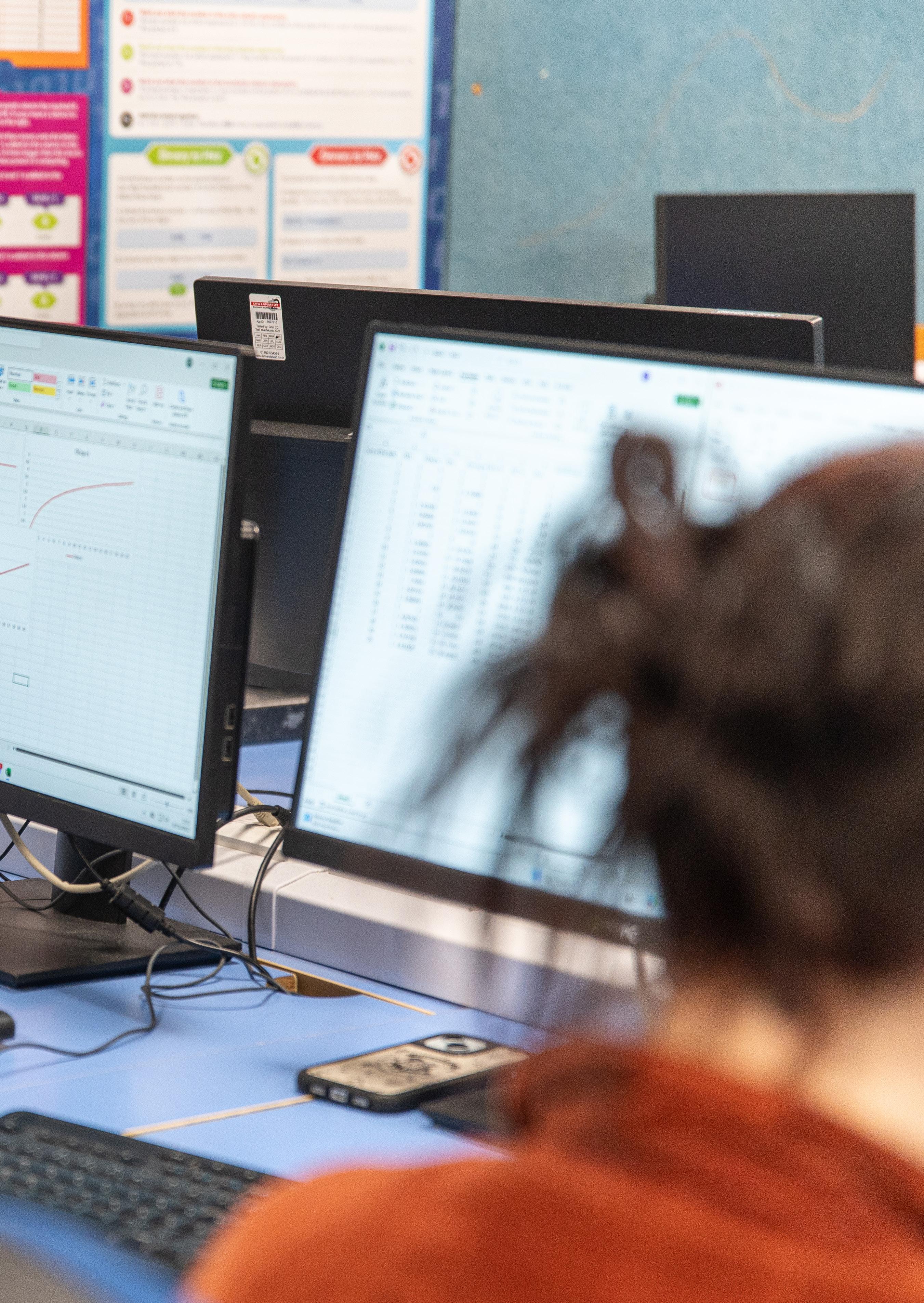
LAW (APPLIED)
What Are Lessons Like In This Subject?
Throughout the course, a variety of different teaching methods are used to support learners’ knowledge and understanding. The lessons concentrate on varied retrieval techniques and group activities. The subject is taught using legal case law and students use this knowledge to apply to scenario-based activities.
Due to the nature of the subject, discussions and debates often occur. Learning is continued outside the classroom with regular visits to the local courts, and we have guest regular speakers including members of the legal profession and the National Crime Agency.
What Will I Study?
• Dispute solving in the English legal system: Civil dispute resolution, enforcement of civil law, how precedent works, application of the law of negligence, damages.
• Investigating aspects of criminal law: Statutory interpretation, legislation, delegated legislation, law reform, European law, legal profession, advice and funding, lay people, elements of a crime, non-fatal offences and sentencing.
• Applying the law: Fatal offences, property offences, general defences, police powers.
• Aspects of tort law: Law of negligence, occupiers’ liability, vicarious liability and land law.
• 50% internal assessment.
• 50% external set task.
• 4 units over 2 years.
Caitlyn Lowe
De Lacy Academy
“The Applied Law course gives a deep understanding of rights and responsibilities, how society works and how offenders are treated and dealt with. It delves deep into each step of the court system and how they are sentenced. It opens many career paths and opportunities which I didn’t think linked with law and it is overall a great and interesting subject.”
Qualification Title
BTEC Extended Certificate in Applied Law
Awarding Body
BTEC

MEDICAL SCIENCE
This course may be a very good option alongside BTEC Extended Diploma in Health and Social Care for students that were previously considering the double or triple health and social care course and who may be interested in health-related careers. Similarly, it may also be a good option for students also interested in studying BTEC Extended Diploma in Applied Science and who are interested in science-related careers. The double and triple courses in Applied Science, and in Health and Social Care, have been discontinued by the government.
What Are Lessons Like In This Subject?
Medical Science is ideal for you if you enjoy learning about human body systems, disease or have an interest in pursuing a career in healthcare or medical research. Medical Science develops key scientific skills to support progress to higher education or employment such as problem solving, organisation, research and analytical skills.
The course is assessed using a mix of exams and coursework. Lessons are taught by teachers who are knowledgeable and have a passion for their subject. You will carry out investigations and independent research as part of the course.
What Will I Study?
• Principles of human physiology.
• Anatomy and pathology.
• Biological molecules, cells and levels of organisation.
• Cardiovascular and respiratory systems.
• Digestive and renal systems.
• Nervous and endocrine systems.
• Musculoskeletal system.
Y12 Coursework Unit
• Practical microbiology and infectious diseases.
• Health issues and scientific reporting: diagnostic techniques for assessing health issues; immune response and dysfunction; genetics and health; cancer; interpretation, analysis and evaluation of scientific information.
Y13 Coursework Unit:
• Biomedical science.

MUSIC PERFORMANCE
What Are Lessons Like In This Subject?
Orientated; performance underpins everything we do in lessons. Much time is spent in lessons on solo and ensemble performance whilst developing the skills to be a good all-round performer. Unit 1 focuses on the theoretical side of music and how important it is to understand the music we perform. Unit 2 considers how the music industry works and particularly how to plan and take charge of a large music event.
We have a suite of practice rooms which can be used for private practice, instrumental and vocal teaching and developing composition ideas. In addition, we create compositions using a number of industry standard notation software packages and digital audio workstations. Student performances take place around college and within the local community. Trips to see professional concerts, musicals, and universities are arranged throughout the year. In addition, professional musicians and speakers regularly visit college to talk to our students.
What Will I Study?
Practical music theory and harmony (mandatory):
• Professional practice in the music industry (mandatory and externally marked). This is a written task that has to be completed in two weeks.
• Ensemble music performance (mandatory and externally marked). This is a task set by the exam board and will be completed within a set time frame. You will study one other unit, which is often solo performance, but this is dependent on your specific strength.
Alexandra Lambert
Carlton Le Willows
“This course has made me a more well rounded musician and taught me skills such as confidence, team work and leadership that I can apply to other areas of my future. I have found completing this course very enjoyable, it is challenging in the best way. Finishing this course I feel confident in working in a professional musical context, being flexible in the genres I can now sing, having a better knowledge of music business and theory, and what it means to be front woman of a band.”
Qualification Title
BTEC Extended Certificate in Music Performance
Awarding Body
BTEC

PERFORMING & PRODUCTION ARTS (ACTING)
What Are Lessons Like In This Subject?
Lessons in UAL Performance and Production Arts are extremely practical and encourage collaborative work between students. Whether you are a keen performer or more interested in directing, backstage/technical support, there are numerous opportunities for you to develop your skillset. Students work together with each other to create live shows that are then performed to live audiences.
Students also have the chance to learn outside of the classroom by going on trips to see live theatre at various venues around Yorkshire.
What Will I Study?
• Units 1-4: An introduction to the skills necessary to explore their creative development.
• Units 5-7: Requires the student to apply their skills, knowledge and understanding in a series of production and performance assessments.
• Unit 8: Students will undertake a production and/or performance role in a performance. An examiner will watch the performance work.
• Work experience in business.
Charlotte May Wilson
De Lacy Academy
“The curriculum is engaging and always interesting. You gain a lot of confidence from the activities and performances themselves. My teacher is very encouraging and makes sure no one is left out or uncomfortable.
I would recommend this course to anyone looking into performing arts.”
Qualification Title
UAL Diploma in Performing & Production Arts
Awarding Body
UAL

PERFORMING & PRODUCTION ARTS (TRIPLE)
What Are Lessons Like In This Subject?
Lessons in triple UAL Performance and Production Arts are extremely practical and encourage collaborative work between students. Whether you are a keen performer or more interested in directing, backstage/ technical support, there are numerous opportunities for you to develop your skillset. Students work together with each other to create live shows that are then performed to live audiences. Students also have the chance to learn outside of the classroom by going on trips to see live theatre at various venues around Yorkshire. There will be extensive opportunities to develop further understanding of potential career pathways open to professionals in the arts industry.
What Will I Study?
• Units 1-4: An introduction to the skills necessary to explore their creative development.
• Units 5-7: Requires the student to apply their skills, knowledge and understanding in a series of production and performance assessments.
• Unit 8: Students will undertake a production and/or performance role in a performance. An examiner will watch the performance work.
• Work experience in business.
• Units 9-11 (Extended Diploma only): Opportunities to explore activities and competencies within performing arts. Students take further responsibility for their own learning and ambitions.
• Units 12 and 13 (Extended Diploma only): Provide opportunities to refine the skills, knowledge and understanding appropriate to their future career path.
Charlotte May Wilson
De Lacy Academy
“The curriculum is engaging and always interesting. You gain a lot of confidence from the activities and performances themselves. My teacher is very encouraging and makes sure no one is left out or uncomfortable. I would recommend this course to anyone looking into performing arts.”
Qualification Title
UAL Extended Diploma in Performing & Production Arts
Awarding Body
UAL

PSYCHOLOGY (APPLIED)
What Are Lessons Like In This Subject?
Psychology is the scientific study of the brain, mind, and behaviour. The role of biology, upbringing and culture on behaviour will be explored, and you will gain a greater understanding of why people act in the way that they do. Applied Psychology involves using psychology in real-life situations. Students will write their own psychological reports, based on independent research into mental disorders, and conducting experiments. Applied Psychology is particularly suitable for students who are reasonably confident with exams, but also like to support their learning with coursework research type tasks also.
Typical lessons include a range of activities where students work independently and collaboratively with others, completing mini white board tasks, exam questions and quizzes, for example.
All lessons involve students being active participants in their learning by taking part in class discussions and sharing thoughts and opinions about topics studied.
What Will I Study?
Year 1
• Psychological approaches and applications to gender, aggression and consumer behaviour. Externally assessed exam.
• Conducting Psychological Research: principles of research, data collection and analysis. Internally assessed written coursework reports.
Year 2
• Health Psychology: Stress and addiction theories and treatments. Externally assessed exam.
• Psychopathology: Definitions of mental illness, types of disorders and treatments.
Internally assessed written coursework reports.
Libby Haughan
Outwood Academy Hemsworth
“The Applied Psychology course was not only extremely interesting and enjoyable throughout the two years, but it has also taught me so many transferable skills which will benefit me going forward to university.
Skills such as my time management when writing assignments and communication skills when taking part in group work and activities.”

SCIENCE (APPLIED)
What Are Lessons Like In This Subject?
Applied Science lessons include a mixture of both theory and practical methods. The theory lessons present new knowledge in small chunks with a focus on how to apply your knowledge and incorporate retrieval practice using online tools such as Kahoot and Seneca.
For the practical aspect of the course you will use equipment such as burettes, volumetric flasks to make and test your own solutions, colorimeters and chromatography to test the purity of solutions and components such as diodes, thermistors and LDRs to make and test electrical circuits.
You will also venture outside to collect biological data to apply statistical tests learnt to real-life situations.
What Will I Study?
You will study topics ranging from cells, atomic structure and bonding to waves and communications.
• Fundamentals of science: You will study topics ranging from cells, atomic structure and bonding to forces and circuits.
• Science in society: You will examine how science is communicated to a variety of different audiences.
• Investigating science: You will develop your scientific skills including planning, recording and interpreting data and analysing and evaluating your own scientific findings.
• Applied Science: Two units in which you further develop your theory and practical skills.
Emily Louise Taylor
“I really enjoy the very practical BTEC Applied Science course. I think coursework is a great alternative for people who work better doing it than exams.”
Qualification Title
Cambridge Advanced National Extended Certificate AAQ in Applied Science
Awarding Body OCR

Ossett Academy
SOUND ENGINEERING
What Are Lessons Like In This Subject?
Lessons in Sound Engineering are very practical to give students the best opportunities to develop your skills for employment or further study at degree level. You will study both independently and as part of a team, depending on the nature of your task, which means each lesson is varied in delivery. You will have access to our state-of-the-art iMac suite(s), complete with industry standard software and our amazing recording studio with top quality microphones, preamps and other equipment.
Finally, the music department are keen to run many different trips for our students to enhance your experience on the course even more. We love to visit industry leading universities and plan to go on music tours overseas, so that you can get real world experience.
What Will I Study?
The course is taught over a series of five different units:
• Studio Recording Techniques: Learn how to set up and use equipment to record in our studios.
• Mixing and Mastering: Learn how to mix and master a track to a professional standard.
• Live Sound: Learn about live sound equipment and how to set it up and run it at a concert.
• DAW Production: Learn how to use different types of music software to create and produce different musical products.
• Working as a Production Team: Work in a team to produce an album.
Conor Jan Zastepa
Horbury Academy
“In studying this course I have been able to gain a further insight into the different sides of this industry besides performing, such as managing live sound, stage management and light work. As well as this, I have become more confident in myself and my work with the help from my teacher.
Sound Engineering has been one of the most fun courses I have studied and I cannot wait to continue it further at university.”
Qualification Title
BTEC Extended Certificate in Music Technology (Sound Engineering)
Awarding Body
BTEC

SPORT
What Are Lessons Like In This Subject?
Lessons on the BTEC Extended Certificate in Sport provide a strong introduction to key areas of the sports industry, with a particular focus on anatomy and physiology. You’ll explore how the body responds to exercise, gaining a deep understanding of the musculoskeletal, cardiovascular and respiratory systems through interactive classroom sessions, group work and applied tasks. Practical elements help bring theory to life-such as testing components of fitness, observing movement patterns, or applying knowledge in gym-based scenarios.
You’ll complete coursework assignments and prepare for external assessments using real-world examples. Although this is a smaller qualification, there are still opportunities for trips, guest speakers and links to local sports providers. Lessons are engaging, supportive, and designed to build your confidence and knowledge, whether you’re planning to go on to higher education, combine with other A Levels, or move into a career in sport, fitness or health.
What Will I Study?
You will complete a range of units throughout your course, including:
• Anatomy and physiology.
• Fitness training and programming for health, sport and wellbeing.
• Professional development in sports industry.
• Practical sports performance.
Zak Turner Hall
Kettlethorpe High School
“The Sport course is great as it provides insights into different parts of sport such as science, coaching and business that you may not have already studied in relation to sport. This means you can look at other categories of sport and help you determine what you may want to do after college. This also helps you develop skills and improve on your already existing qualities and characteristics.”

SCAN THE QR CODE TO FIND OUT HOW OUR SPORTS TEAMS PERFORMED IN OUR ANNUAL SPORTS REPORT
Qualification Title
BTEC Extended Certificate in Sport
Awarding Body
BTEC

SPORT (DOUBLE)
What Are Lessons Like In This Subject?
Lessons on the BTEC National Diploma in Sport offer a dynamic mix of theory and practice, designed to reflect real-life sporting contexts. You’ll explore topics such as fitness training, coaching, and anatomy and physiology through classroom activities, group work, and practical sessions. Learning is hands-on and engaging, with opportunities to apply your knowledge in real scenarios-like leading sessions, analysing performance, or designing training programmes.
The course is enhanced by trips to universities and National Institutes of Sport, as well as potential international work placements through the Turing Scheme, with recent visits to Malta and Italy. You’ll also benefit from guest speakers, access to modern sports facilities, and supportive tutors with industry experience. Lessons are focused on developing your skills, confidence, and understanding, helping prepare you for further study or a career in the sports industry.
What Will I Study?
You will complete a range of units throughout your course, including:
• Anatomy and physiology.
• Fitness training and programming for health, sport and wellbeing.
• Professional development in the sports industry.
• Sports leadership.
• Application of fitness testing.
• Sports injury management.
• Work experience in sport.
• Investigating business in sport and the active leisure industry.
Alexandra Rigg
Oulton Academy
“This course is very good as it covers all areas of sport, It is mainly coursework which is good for those who don’t feel confident sitting many exams. It has a lot of practical within the course that is required for part of your grade, this is good for people who enjoy leading/taking part in sport.”


SPORT (TRIPLE)
What Are Lessons Like In This Subject?
Lessons on the BTEC Extended Diploma in Sport are varied, practical, and designed to reflect real-world sporting environments. You’ll engage in interactive classroom sessions, practical activities, group projects, and presentations. One day you might be analysing performance using video feedback; the next, delivering a training session or exploring anatomy in a gym setting. Learning is active and applied, with case studies, guest speakers, and visits to universities and National Institutes of Sport enriching your experience. You’ll complete assignments based on realistic scenarios, such as designing fitness programmes or planning sports events.
There are also exciting opportunities for international work placements through the Turing Scheme, with recent destinations including Malta and Italy. With access to modern sports facilities and expert tutors with industry knowledge, lessons are supportive and focused on preparing you for careers in sport or progression to higher education.
What Will I Study?
You will complete a range of units throughout your course, including:
• Anatomy and physiology.
• Fitness training and programming for health, sport and wellbeing.
• Professional development in the sports industry.
• Sports leadership.
• Application of fitness testing.
• Practical sports performance.
• Coaching for performance.
• Sports injury management.
• Work experience in sport.
• Investigating business in sport and the active leisure industry.
• Development and provision of sport and physical activity.
• Research methods in sport.
• Exercise, health and lifestyle.
Zak Turner Hall
Kettlethorpe High School
“The Sport course is great as it provides insights into different parts of sport such as science, coaching and business that you may not have already studied in relation to sport. This means you can look at other categories of sport and help you determine what you may want to do after college.
This also helps you develop skills and improve on your already existing qualities and characteristics.”
Qualification Title
BTEC Extended Diploma in Sport
Awarding Body
BTEC


SCAN THE QR CODE TO FIND OUT HOW OUR SPORTS TEAMS’ PERFORMANCE IN OUR ANNUAL SPORTS REPORT
UNIFORMED PROTECTIVE SERVICES
What Are Lessons Like In This Subject?
We offer different qualifications on the Uniformed Protective Services course from the Extended Certificate (1 A-level equivalent) to the Extended Diploma (3 A-level equivalent). The course is an introduction to the protective services sector and predominantly focuses on agencies such as the police, fire service, armed services and prison service. This pathway is ideal for supporting learners who want to progress to higher education courses in the sector, before entering employment. The course is diverse, exciting and challenging and gives learners the opportunity to not only study inside the classroom but to also take part in fitness focused units and various offsite activities.
Throughout the duration of the course, you will be given the opportunity to grow in confidence with a variety of different educational visits, including paintballing, water-sports and army days. It also enhances your knowledge on specific services through insight days and guest speaker sessions. You will have the chance to attend university open days to gain important information on various related courses which will help to widen your options and support your aspirations.
What Will I Study?
Each course is made up of various units comprised of both internally assessed coursework and one or more externally assessed exam.
The content delivered on the course is varied and may include some of the below units.
Veronika Podlesna
St Wilfrid’s Catholic High School
• Behaviour and discipline in the Uniformed Protective Services.
• Teamwork, leadership and communication in the Uniformed Protective Services.
• Physical preparation, health and wellbeing.
• Skills for outdoor activities and the Uniformed Protective Services.
• Introduction to criminology
“There is so much variety with what we do and it allows you to go down all different paths after college. This course also lets you go and experience what it would be truly like in different sections of the services. My teacher truly helps understand what you are doing and gives you time if you’re struggling with anything.”

UNIFORMED PROTECTIVE SERVICES (TRIPLE)
What Are Lessons Like In This Subject?
If you’re passionate about a career in the police, fire service, military, or other emergency and protective roles, the BTEC Level 3 Extended Diploma in Uniformed Protective Services is the perfect stepping stone. This extended diploma offers a more in-depth and comprehensive study, giving you the skills and knowledge needed to excel in demanding uniformed professions.
Throughout the course, you’ll cover a wide range of topics including law enforcement, emergency response, public safety, conflict management, and leadership. You’ll also develop essential skills like teamwork, communication, fitness, and decision-making through practical activities and real-life scenarios. This course includes various physically demanding tasks both inside and outside of college, placing individuals outside their comfort zones. The course offers insight into the UPS roles, expectations and real-life experiences linked with each. This is offered through internal assignments over 2 years, examination units and various physically demanding practical assessments and scenarios.
There are opportunities to engage with the UPS directly, such as fire, military, police, and prison services. This course gives a real-life view of what life within the various branches of the UPS is like and enables students to prepare for their chosen career.
What Will I Study?
• Citizenship and Diversity.
• Behaviours and Discipline.
• Expedition Skills.
• Teamwork, leadership and Communication.
• Government and the UPS.
• Physical Preparation.
• Police Powers.
• Professional Development.
• Planning for Emergency response to Incidents.
• Custodial Care.
Curtis Tayavon Limbert
St Wilfrid’s catholic High School
“This course overall is very good because you get to experience what public services is like and what you can expect in the future. The best thing about this course is the my teacher, who has helped us a lot through the work and tried his best to get us the best grade possible.”
Qualification Title
BTEC Extended Diploma in Uniformed Protective Services
Awarding Body
BTEC

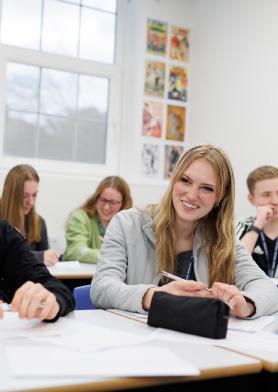
FAQS
Our team of Progress Tutors, all with knowledge, skills and experience of providing advice and guidance for young people, will be the ones who will provide the first line of support. If you are finding the subjects difficult then your Progress Tutor will arrange for you to attend additional sessions such as our subject access period. Furthermore, our study support teams will be on hand to provide individual help for students requiring help with study skills, writing skills and GCSE Maths.
The college also provides a confidential counselling service that offers students a place and time to think and talk about specific problems and difficulties you may be having.
What If I Find College Difficult? Will I Be Able to Change Subjects Once I Start?
Yes. We ask students to remain in subjects for the first week to ensure you give them a chance before providing a three week zone in September where we allow students to change subjects. This is dependent upon there being places available in the subjects you would like to change to, and you must have the right subject specific entry requirements. Finally, we arrange for you to sit in on a lesson just to ensure you know what the new subject entails.
How Many Subjects Will I Study?
If studying A-levels, you will study three A-levels unless agreed with the college that you may study four. If you have not achieved Level 4 in GCSE Maths then you will take 3 A-levels plus GCSE Maths resit. If studying Applied General qualifications you can choose to study different combinations such as:
• BTEC/CTEC Extended Diploma = (three A-level equivalent).
• BTEC/CTEC Diploma = (two A-level equivalent).
• BTEC/CTEC Extended Certificate = (one A-level equivalent).
• UAL Awarding Body Diploma = (one A-level equivalent).
• UAL Awarding Body Extended Diploma = (three A-level equivalent).
• WJEC Diploma = (one A-level equivalent).
Your Applied General programme must add up to the equivalent of at least three A-levels. Your tutorial will fit alongside your chosen subjects on your timetable each week.
What Is The Difference Between A-levels and Applied General Qualifications?
A-levels are predominantly assessed by exams. Although some A-levels have some coursework, this is usually a relatively small element of the assessment. In contrast, in our Applied General qualifications (BTEC, CACHE, UAL Awarding Body and WJEC) coursework usually makes up 50% or more of the qualification, alongside mandatory exams or controlled assessments.
This means that if you find exams difficult, you should consider taking an Applied General qualification.
How Will My Parents/Guardians/Carers Know If I Am Doing Well at College?
At New College we have a fantastic system that allows parents, guardians and carers to remain fully informed of your progress. You and your parents will be given access to Cedar (accessed via the Internet) using the email address you gave us on your application form.
This enables them to see your attendance and performance as lessons take place. It also informs them of all the Cedar assessment grades you achieve and it allows them to read all pastoral logs that staff write about you.

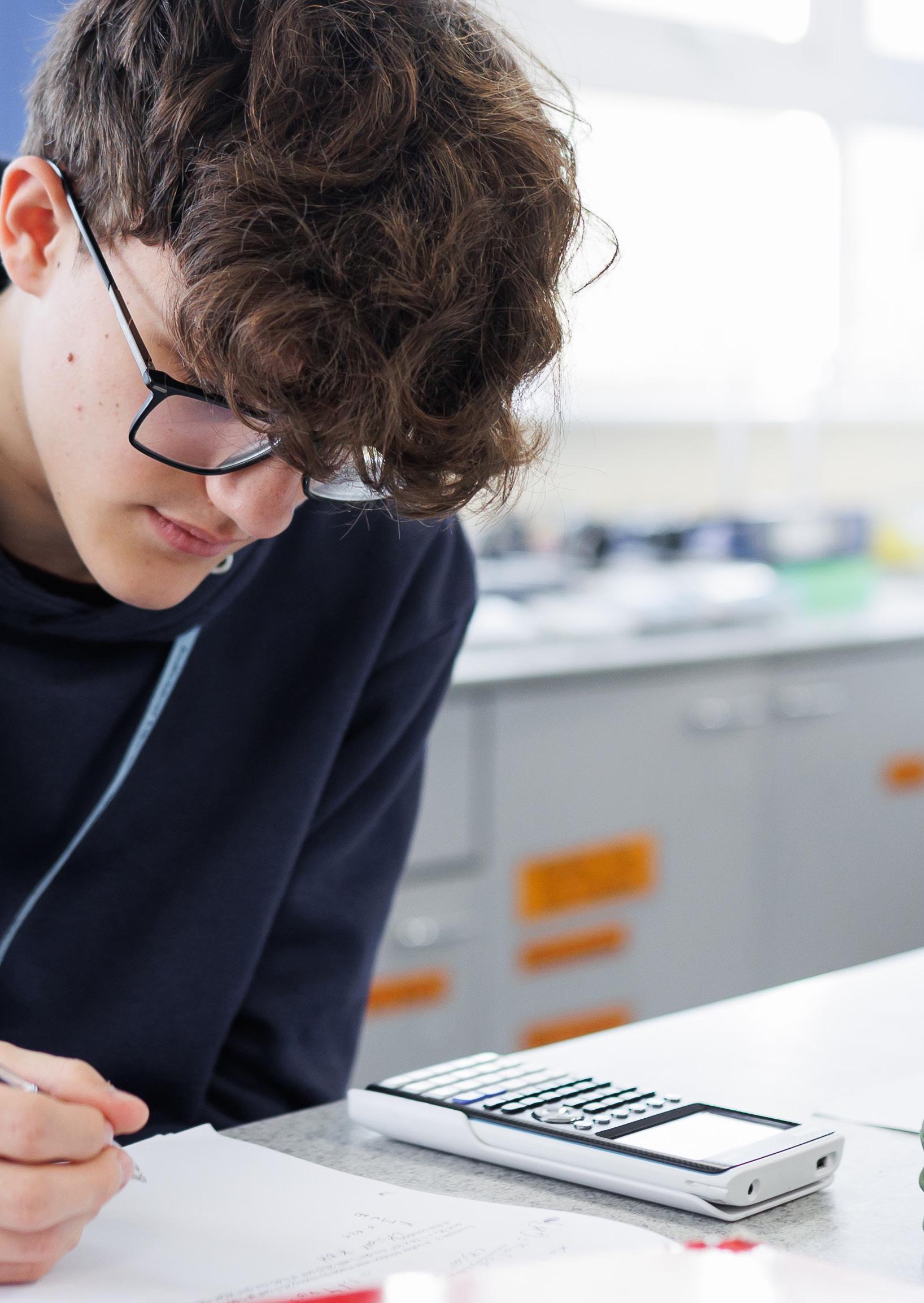
FAQS
How Will New College Help Me Choose my Subjects?
Because this is as important to us as it is to you, we provide as much quality advice and guidance as possible before enrolling onto your chosen subjects. This process is made up of four stages.
• Firstly, our open events are centred around subject choices. Both our staff and current students are available to give advice and answer questions whether you would like a member of staff’s perspective or the view of our current students.
• You will then be invited to an Interview Evening with our experienced interviewers where subject choices and career ambitions will be discussed.
• You will then be invited to attend our Offer Holder Day once you have left school in July. After spending the day in subject sessions you will discuss with your Progress Tutor whether you are happy with your chosen subjects.
• Finally, at enrolment, you will have an interview which again will focus on your subject choices, but this time will take into account the GCSEs you have achieved. A short discussion with a senior member of staff will follow to check that the subjects you have chosen are suitable for you and your aspirations.
When Does the College Day Start and Finish?
Lessons start at 8.50am and finish at 4.00pm on most days. However, your day will depend on your timetable.
Students are only registered in timetabled lessons so free periods, which we refer to as ‘directed time’, are up to you. During this time we will expect you to manage a balance between meeting friends and studying in one of our learning zones.
For example, if your first lesson of the day is not until 10:35am then you will not be expected to be in College until then, unless you decide to come in voluntarily or you use a college bus.

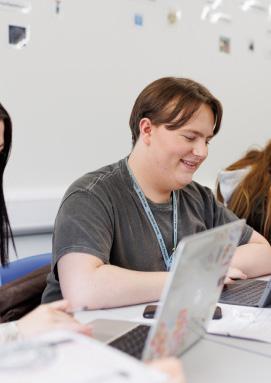
WHAT NEXT?
Have You Attended An Open Event?
Saturday 18th October 2026 Tuesday 25th November 2026
Have You Put In Your Application at: ncpontefract.ac.uk/apply?
Have You Received Your Confirmation Email?
Date Applied:
Have You Received Your Interview Invitation?
Interview events take place in December, January, February and June depending on when you applied. You usually receive your date in a letter and few weeks before each date
Interview Date:
What Courses Have I Been Offered?
Your Offer Letter Is Important. Jot Down Here Where You Have Kept It:
Have You Received Your Induction Day Letter?
You should receive this letter in June. This is an important letter that contains instructions about what to do if you cannot attend the event.
Date Received:
Have You Received Your Enrolment Day Letter?
You should receive this letter in late July. This is an important letter that contains instructions about what to do if you cannot attend the event.
Date of my Offer Holder Day:
Have You Received Your Summer Independent Learning?
Your SIL tasks will be uploaded to the website by the end of June.
THANK YOU. WE’LL SEE YOU ON YOUR FIRST DAY IN SEPTEMBER!
